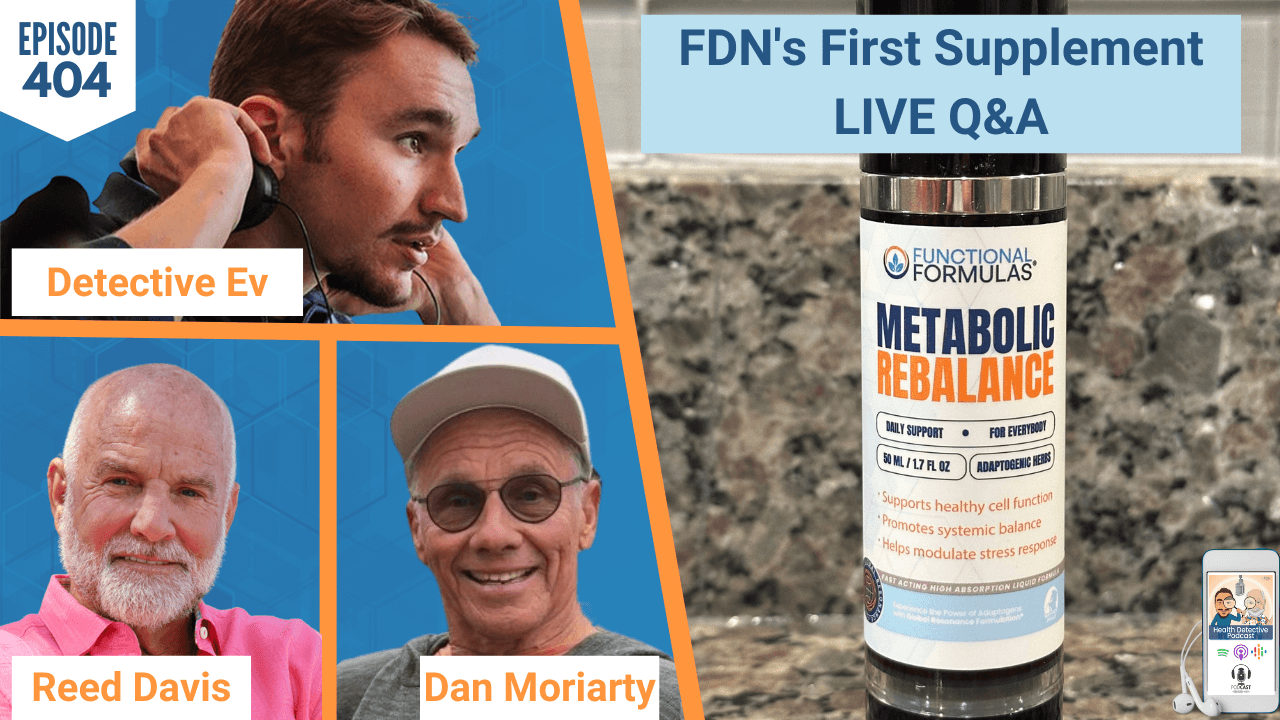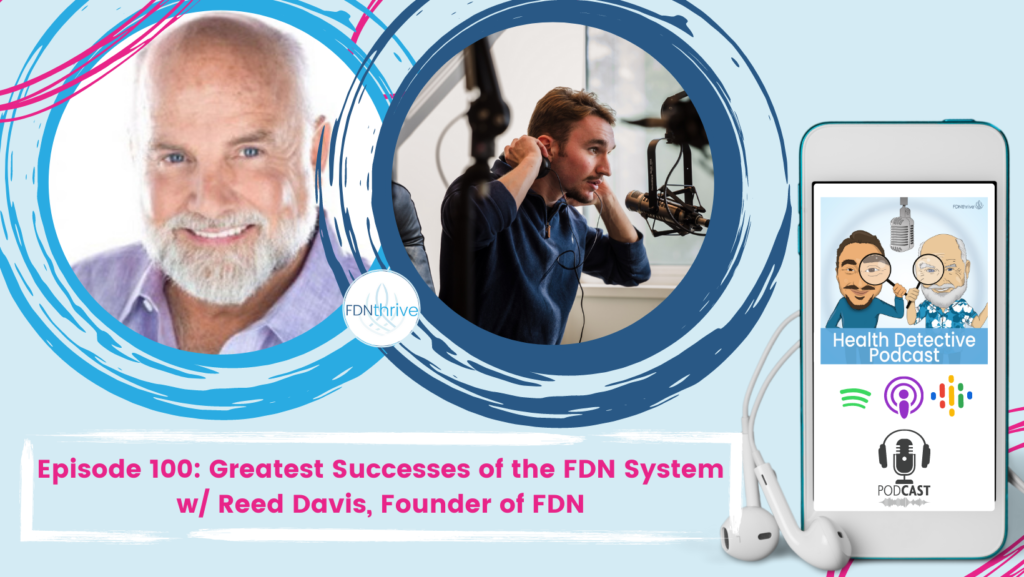
Introduction
[00:00:50] Evan Transue: What is going on guys? Welcome back to another episode of the Health Detective Podcast by FDNthrive. My name’s Evan Transue, AKA, Detective Ev. We are very excited to have you today. We’ve got a special episode with a special guest, none other than, Mr. Reed Davis, Founder of FDN about the FDN system.
How are we doing, man?
[00:01:06] Reed Davis: Fantastic Ev, and congratulations on all the amazing things you’ve done here with this podcast.
I know this is our 100th recording. So, Evan asked me if I’d appear. Of course, you know I’m ready for anyone, anytime, anywhere, any place.
[00:01:18] Evan Transue: Yeah. That’s what’s going to be fun because Reed’s actually going to be doing a lot more on the podcast. We’re going to have him on for interviews as we’ve gotten bigger, and the guests continue to grow or get bigger themselves.

With that said, hundred episodes has been super fun. We’ve had incredible stories on here. As you guys know, we bring on people from all walks of the functional health space, but primarily we do talk to FDNs, people who have been through the FDN program. The reason we prioritize that is because they have the best stories in the functional space, let’s be honest, certainly with that level of consistency.
I’m not saying we haven’t heard amazing stories when you talk to some random doctor or some person; you do hear those. But never do you go somewhere and see over and over and over again. We’re not saying that we’re promising this. All this is about is just changing your lifestyle.
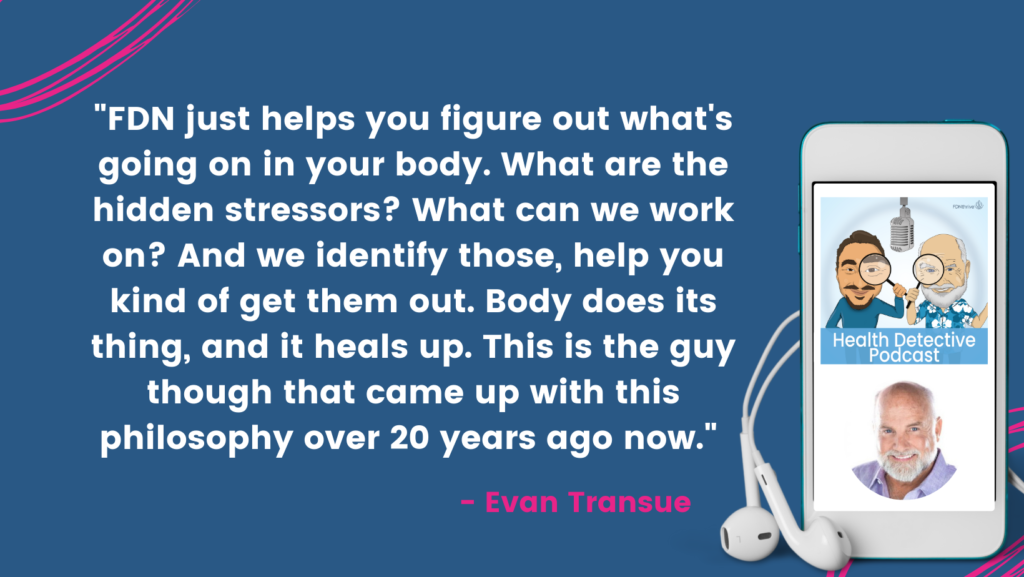
The FDN System Identifies the HIDDEN Stressors
But this person doesn’t have cancer symptoms anymore. This person doesn’t have autoimmune symptoms. These are all things that have happened on this podcast. FDN just helps you figure out what’s going on in your body. What are the hidden stressors? What can we work on? And we identify those, help you kind of get them out. Body does its thing, and it heals up. This is the guy though that came up with this philosophy over 20 years ago now.
[00:02:20] Reed Davis: Over twenty years ago. Yeah, about twenty-two.
[00:02:23] Evan Transue: Almost as long as I’ve been alive. I think this is a good guy to be talking to, to really show you guys what are the best stories from this.
How Did the FDN System Start?
I think actually a great way to start off would be, how did you even realize you were onto something with this because you were working with a chiropractor? When did you even start to begin to develop the FDN system? Yes, we talked about this a little bit in episode one, but I’m sure we have listeners that have never gone all the way back to episode one. How did the FDN system start?
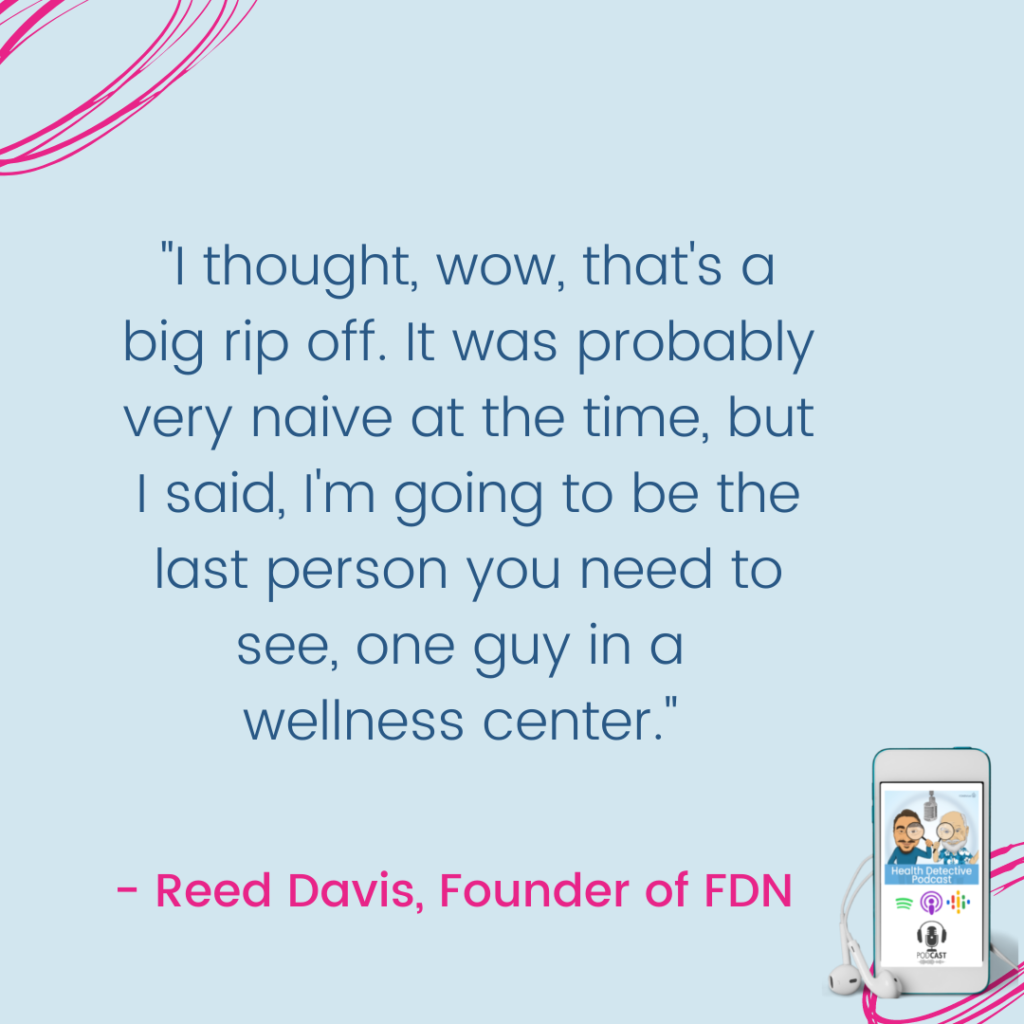
[00:02:46] Reed Davis: It started when I was working in a clinic. I wanted to help every person walking in the door. Everybody was already seeing three or five or eight or ten different practitioners and they weren’t well yet. I thought, wow, that’s a big rip off. It was probably very naive at the time, but I said, I’m going to be the last person you need to see, one guy in a wellness center.
We had chiropractic, acupuncture, massage, nutrition. Matter of fact, I was the nutritionist and personal trainer, by the way. I just started running labs and trying to get to the bottom of it. People were tired of just taking pills or being told nothing’s wrong with you or going from one therapy or product or diet to the next. We call that “the cycle of trial and error.”
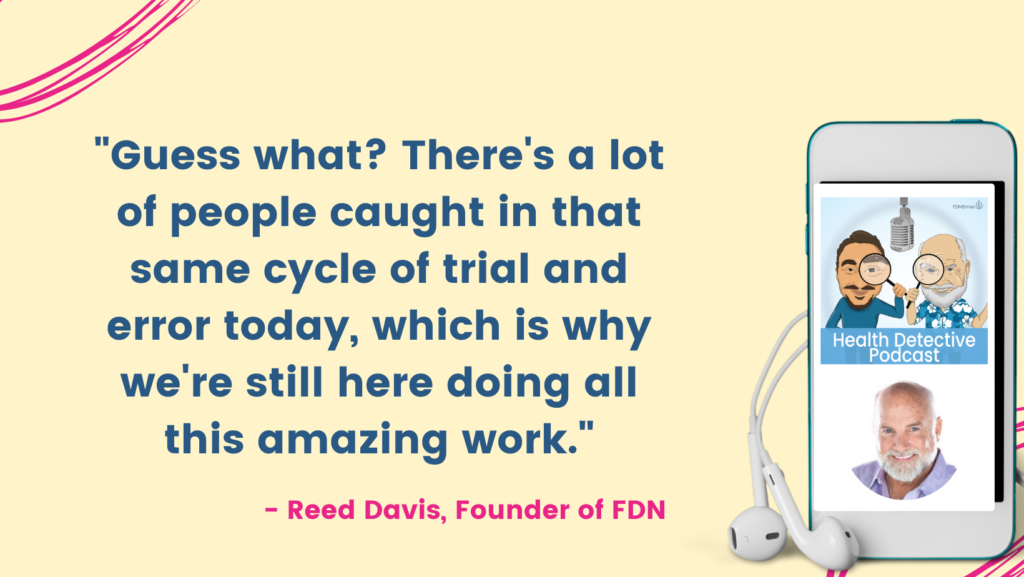
People were caught in this cycle of trial and error, twenty-two years ago, when I started looking for solutions and guess what? There’s a lot of people caught in that same cycle of trial and error today, which is why we’re still here doing all this amazing work.
The FDN System Avoids the Cycle of Trial and Error
[00:03:42] Evan Transue: You have phrased it as a cycle of trial and error because you’ve been talking about that since I went through FDN. Most people don’t realize that they’re in it, but when I talk to them about it, or when someone else said FDNthrive does, they’re like, oh, that sounds like me. I’ve been going to doctor, to doctor and trying this out. Then they end up in the natural version of it, where they’re going to the health food store and buying every random supplement. They got no idea what’s going on.
[00:04:04] Reed Davis: Well, functional medicine, unfortunately, is still working on the same paradigm as standard medicine. They diagnose and treat specific things and it’s trying to be more natural functional medicine. Thank God it’s there because they work a little higher up into the causal level, but many of their patients are still stuck in a frustrating cycle. It’s because the functional medicine hasn’t broken out of – you have to provide a diagnosis to get paid by the insurance company.
You can’t just say what we say, is its metabolic chaos. There’s a lot of things going on at the same time. We can address it all at the same time. Physicians unfortunately can’t do that because they’re bound by their licenser. They’re bound by the medical and the financial model. You got a diagnosis and treat something to get paid by an insurance company.
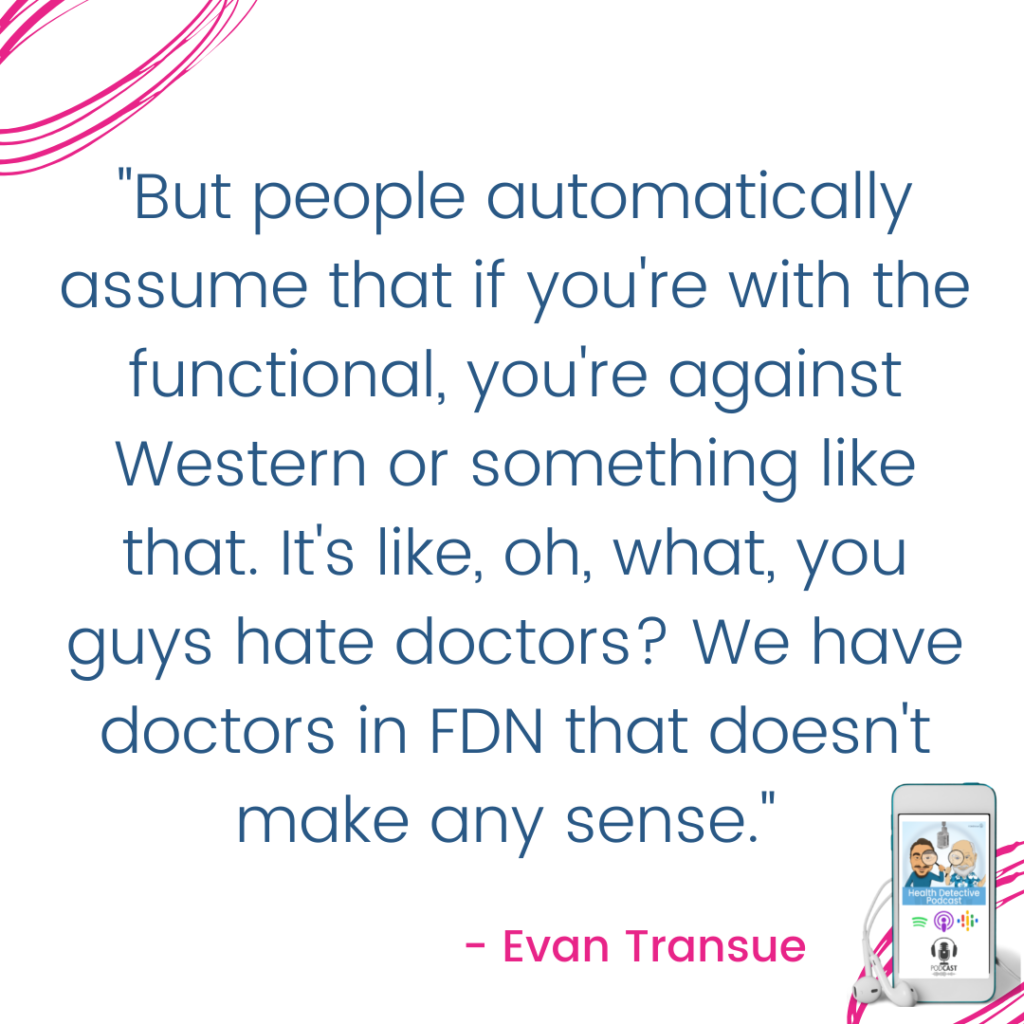
FDN Has Medical Doctors Involved
[00:04:51] Evan Transue: That’s what people don’t get, because it’s a shame and we’re really good at wording this correctly, I think, especially on the podcast and in FDN in general. But people automatically assume that if you’re with the functional, you’re against Western or something like that. It’s like, oh, what, you guys hate doctors? We have doctors in FDN that doesn’t make any sense.
They’re in a system. It’s not the doctor that’s doing something bad. The system might not be optimized for the chronic disease that we’re seeing in today’s world. Often, I don’t think it is. I know that was the case for me. I know that was the case for my mom. It’s very limited. It only allows you to treat certain things, with the medications or whatever.
For my mom, for example, she gets a medication, Synthroid. That doesn’t work. We’ll just remove your thyroid. The thyroid must be the problem. It’s like, holy cow, wish we found FDN before that. But she’s doing great now because of this.
I’m curious, twenty-something years ago, I know people that are calling FDN very often, or FDNthrive, I should say, it’s usually within the last five to ten years that they started dealing with stuff. I feel like a lot of people are waking up to the chronic health epidemic, but it sounds like stuff was already going on then. Who was kind of the main client or person walking through the door and what were they dealing with? Did they have a diagnosis?
The FDN System Treats Everything Non-Specifically
[00:05:53] Reed Davis: You know, it’s funny you ask, cause I keep telling my trainees and my graduates, everybody, that we don’t treat anything specifically; we treat everything non-specifically. That means that our protocols have to have an effect, a beneficial effect on every cell, every tissue, every organ, every system, the entire organism.
Basically, the people who’ve lived themselves into these problems, their chronic degenerative diseases that come from lifestyle and the environment and all the sort of bad stuff that’s out there. So, guess what, if you sorted out what areas need to be healed, then you can heal those areas by doing the opposite things.
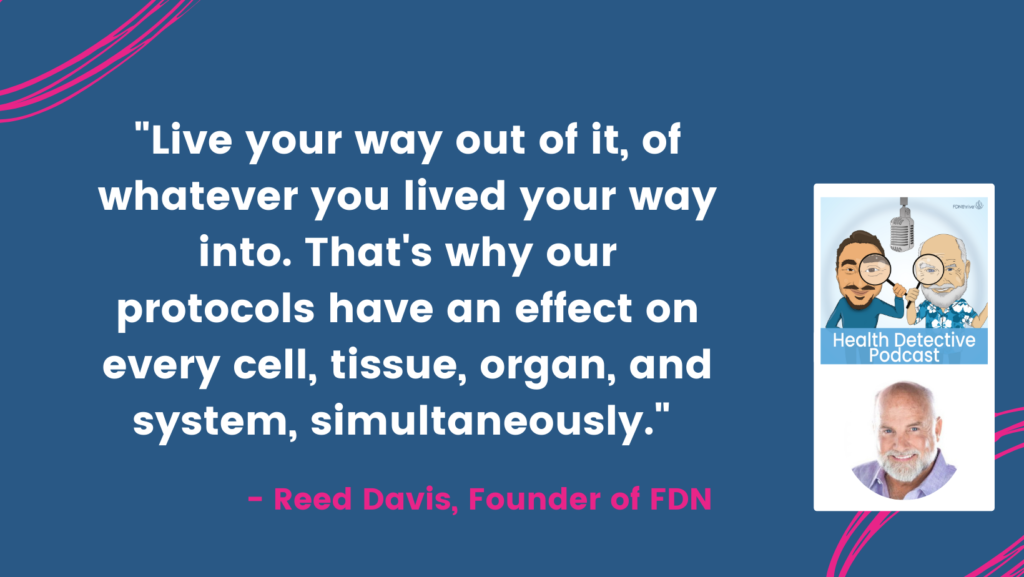
Live your way out of it, of whatever you lived your way into. That’s why our protocols have an effect on every cell, tissue, organ, and system, simultaneously. We can’t ever get in trouble for practicing medicine without a license, because we never diagnosed anything specific.
[00:06:44] Evan Transue: Yeah, well, we’re definitely, certainly not practicing medicine, even kind of, right?
The FDN System Stays in Its Own Back Yard
[00:06:48] Reed Davis: Well, we don’t want to. We give a complete monopoly to diagnosing and treating specifics to those that are licensed to do so. We don’t want to be in their backyard. If you need that, get that. If you have some downward spiraling, real serious condition, and the progression of that is very contracted, then you need to get intervention.
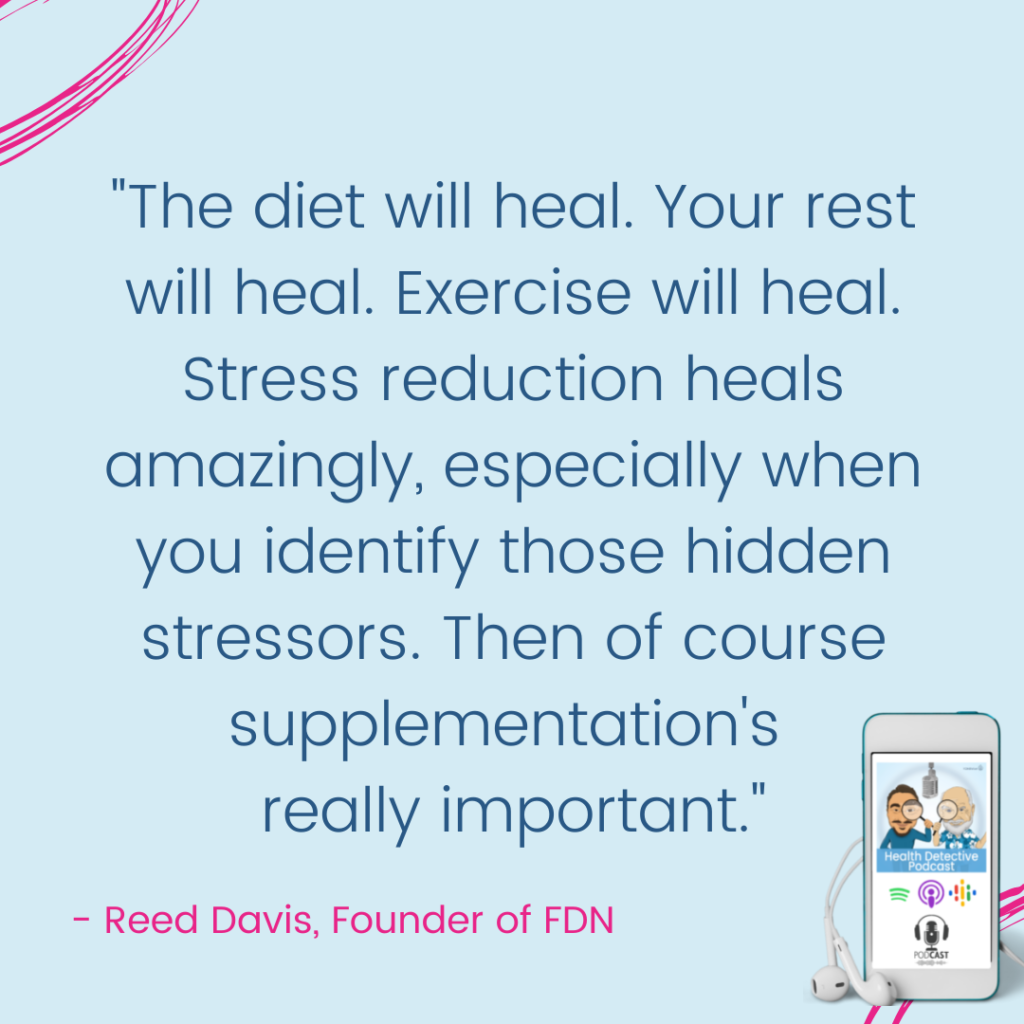
Now, we come along and the observations we make, they do require time to heal. The diet will heal. Your rest will heal. Exercise will heal. Stress reduction heals amazingly, especially when you identify those hidden stressors. Then of course supplementation’s really important.
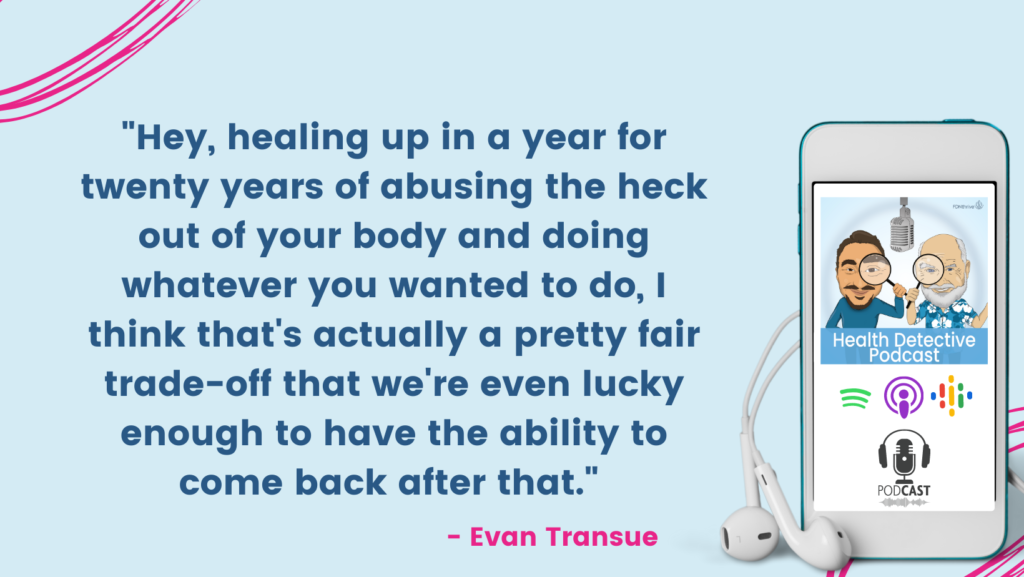
[00:07:29] Evan Transue: Sure. I think that’s kind of the amazing thing is yes, it does take time to heal. The body can heal guys, but it’s not going to be overnight. You know, you might’ve been sick for twenty years, but if you really work your butt off and you do this stuff right, that’s where nature’s amazing. Because the body might actually be able to heal itself up in a year.
Hey, healing up in a year for twenty years of abusing the heck out of your body and doing whatever you wanted to do, I think that’s actually a pretty fair trade-off that we’re even lucky enough to have the ability to come back after that.
Main Client & Symptoms
So just to be clear, cause I think you were kind of prefacing, what were these people walking into your clinic with? Who was the main client and what were the symptoms?
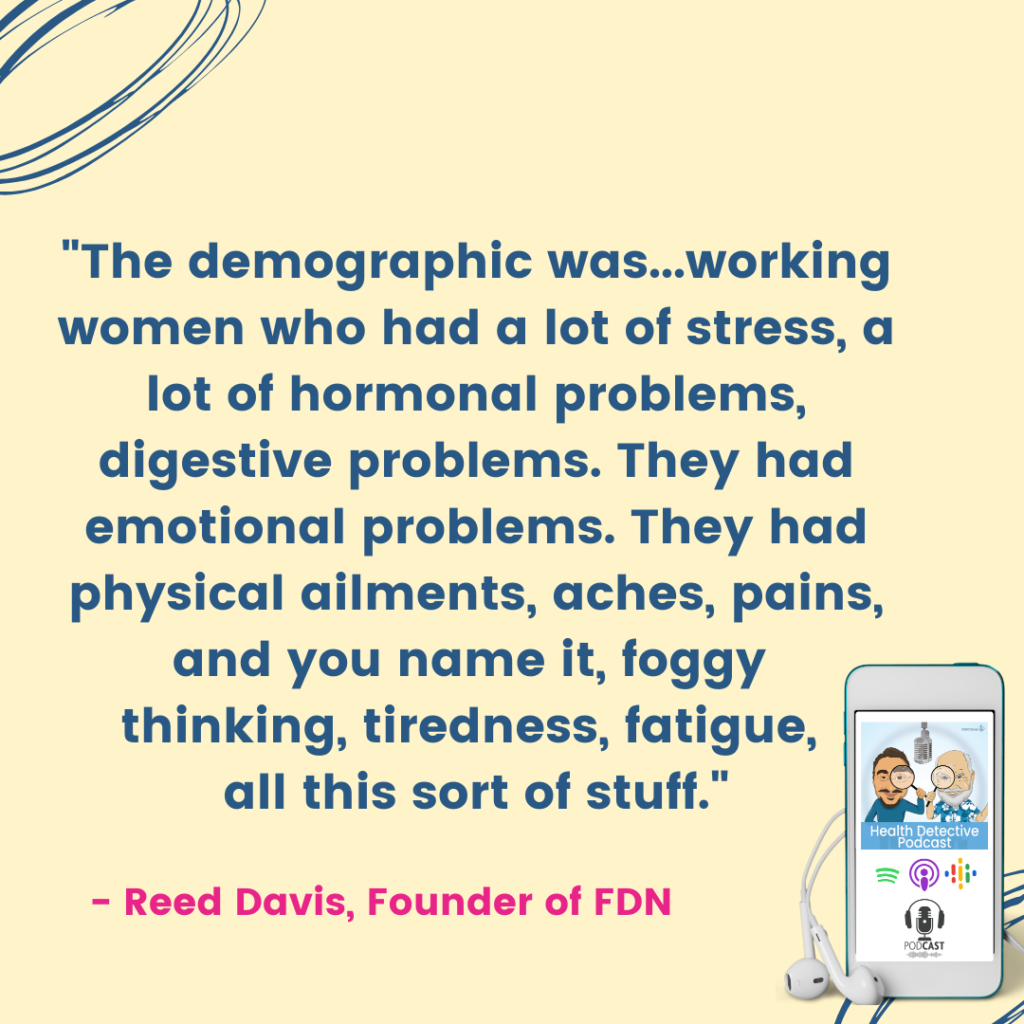
[00:08:00] Reed Davis: Yeah, the demographic, if you will, was mostly women, working women. Their kids were middle or sort of older, even out of the nest, so to speak. They’re working women who had a lot of stress, a lot of hormonal problems, digestive problems. They had emotional problems. They had physical ailments, aches, pains, and you name it, foggy thinking, tiredness, fatigue, all this sort of stuff.
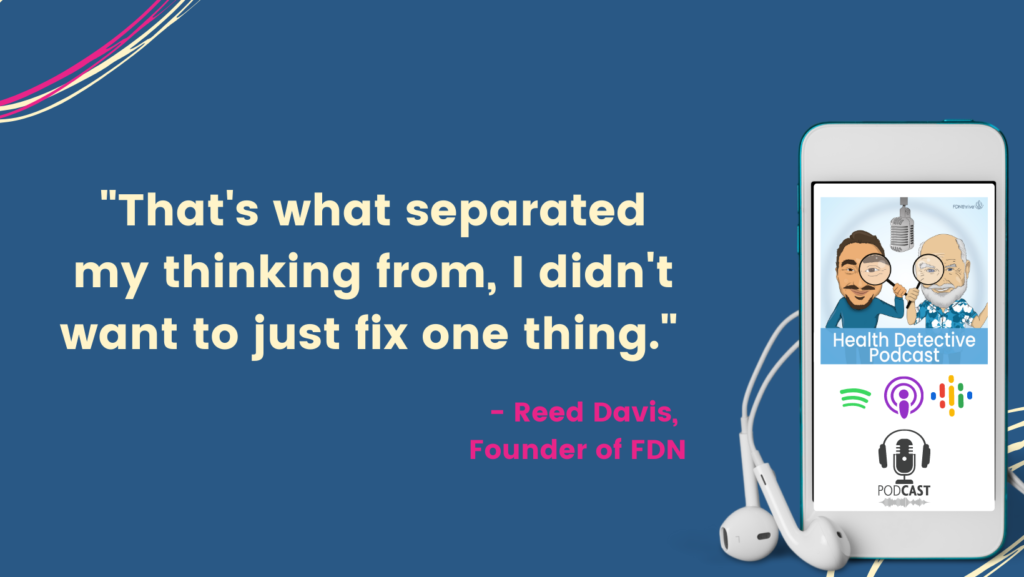
Guess what? They had all of that going on at the same time. That’s what separated my thinking from, I didn’t want to just fix one thing because then I’d just be guy number eight. They’d been to seven, I’ll be number eight and then there’ll be a number nine, ten, eleven, twelve. I didn’t want to be that guy who just help them with one thing.
So, it was mostly women. Now, once we had success, they brought me their husbands. They brought me their children. That’s why FDN now is expansive. There’s almost no one it can’t help.
[00:08:52] Evan Transue: I think it makes a lot of sense that, unfortunately, women got affected by this first. And I think they care more in general, too, about their health.
[00:08:59] Reed Davis: We care about our cars.
A Woman’s Million Different Things
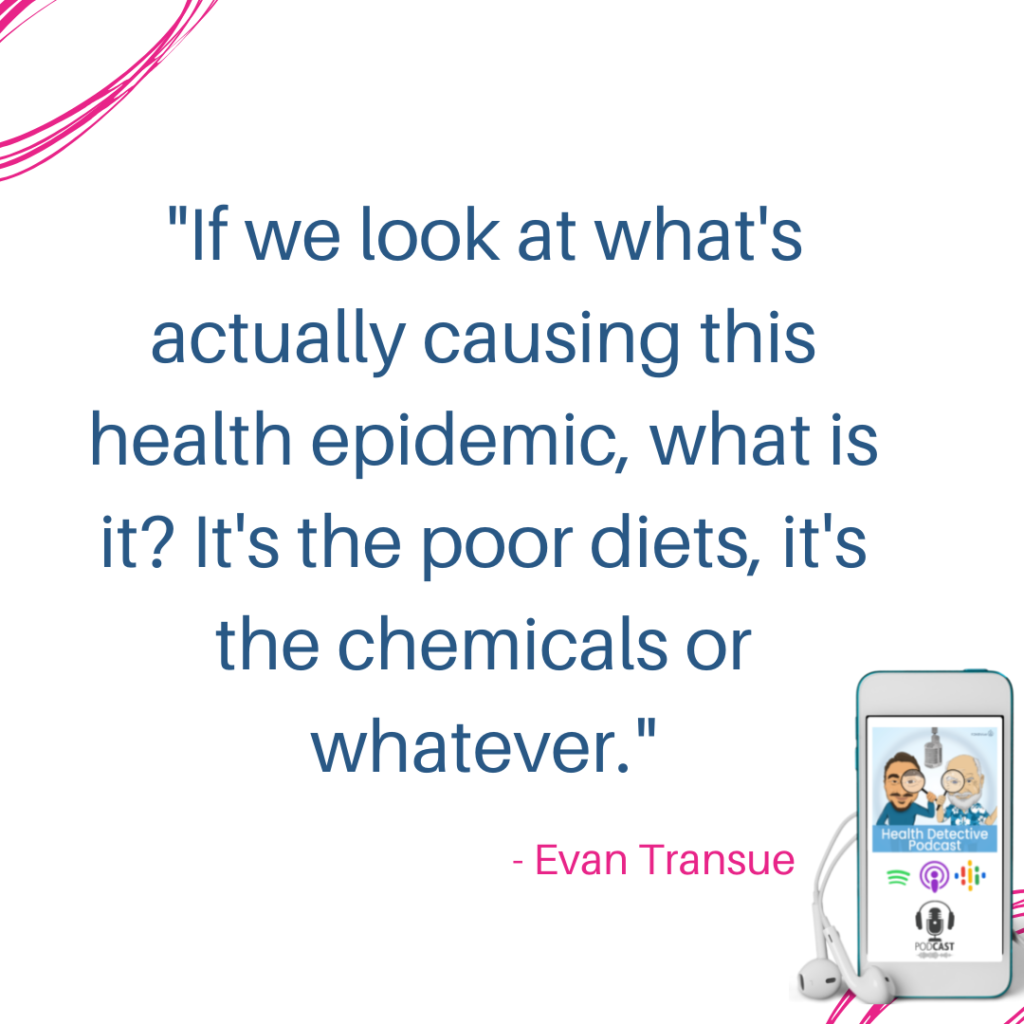
[00:09:01] Evan Transue: And we’ll keep going until we’re really shot, until we can’t go any more. Then we’re like, alright, we gotta do something about this, you know? I think women are a little smarter in that way. But the other problem is if we look at what’s actually causing this health epidemic, what is it?
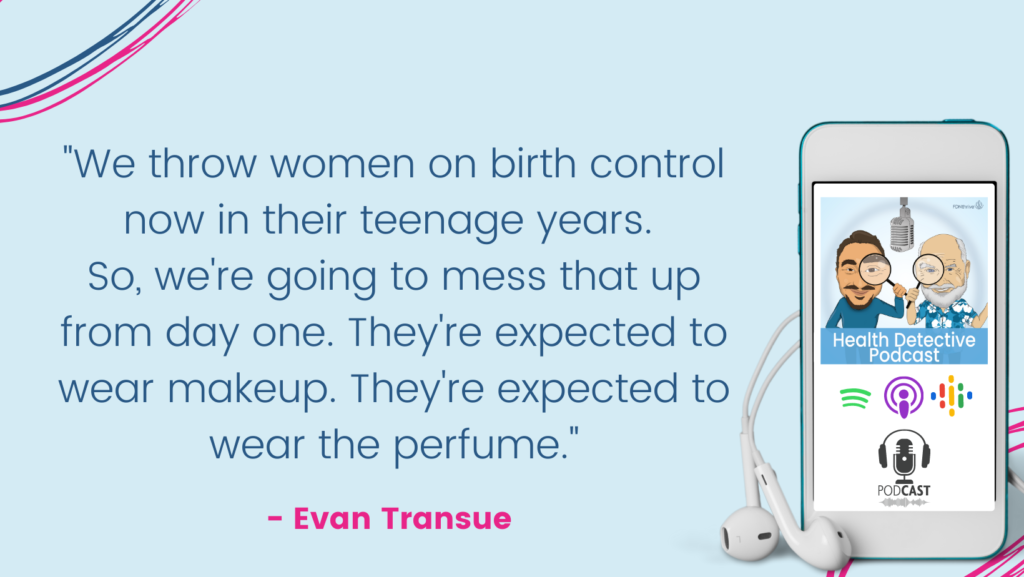
It’s the poor diets, it’s the chemicals or whatever. And who in general has to put more chemicals on their body or deal with more type of stuff? We throw women on birth control now in their teenage years. So, we’re going to mess that up from day one. They’re expected to wear makeup. They’re expected to wear the perfume.
I forget what the exact stat is on the toxic load. Their toxic load from those kinds of products is so significantly higher than men. Now, their body’s got to deal with all that. I mean FDNthrive serves all types of clients, but you still do see this dominating kind of person of a middle-aged woman, who has been sick for a while and she’s going, and she worked her butt off, man.
And it’s just like, I can’t do this anymore because no one is able to help me. There’s so much going on. It’s like, well, we can tell you why. There’s a million different things in your life that’s happening to you. So, I think this has branched out much farther than them now though, because I was a five-year-old kid, male, when I first started experiencing symptoms. I think this is long past just middle-aged women now. Now everyone’s getting affected by this.
The FDN System Finds the “Why”
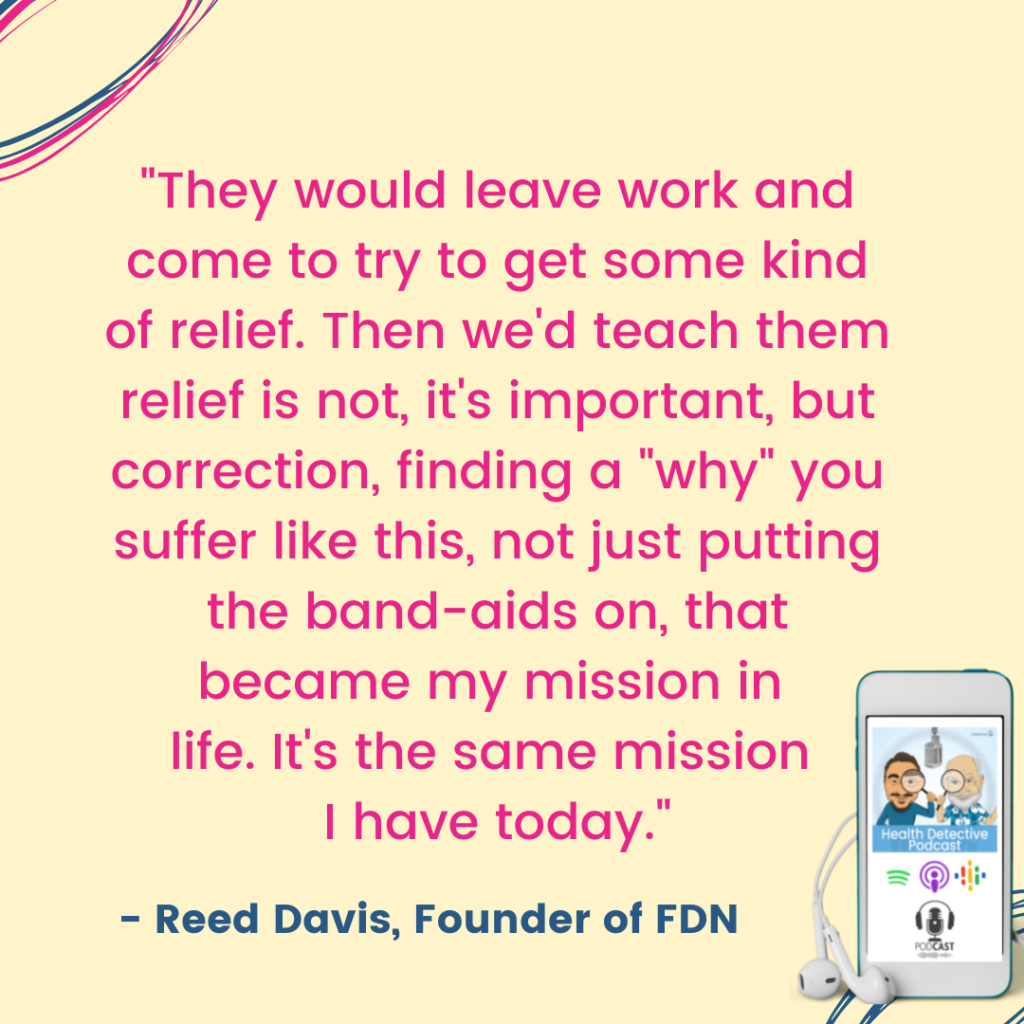
[00:10:07] Reed Davis: Well, you asked, you know, what was the main demographic? So, I was in a wellness center and twenty-two years ago, it was mostly women. They would leave work and come to try to get some kind of relief. Then we’d teach them relief is not, it’s important, but correction, finding a “why” you suffer like this, not just putting the band-aids on, that became my mission in life. It’s the same mission I have today.
[00:10:31] Evan Transue: Sure. Now I want to get into some, like the stories, because I know we could do this for days, probably. Reed’s worked with thousands of people directly over the years. Who knows how many? You count your graduates. This is probably a number we couldn’t even count at this point. How many people have been helped?
[00:10:44] Reed Davis: It’s high six figures. It’s way up there.
[00:10:46] Evan Transue: Because I don’t wanna necessarily jump to the best story first. I kind of am curious, what was the first time you knew you wanted to do something different? You start to do something different. What’s the first time that you remember someone got like amazing results? You’re like, oh, damn. This is it, I figured this out, kind of.
Cycle of Trial & Error Examples
[00:10:59] Reed Davis: Let me just preface that with back to that cycle of trial and error that I recognized right away.
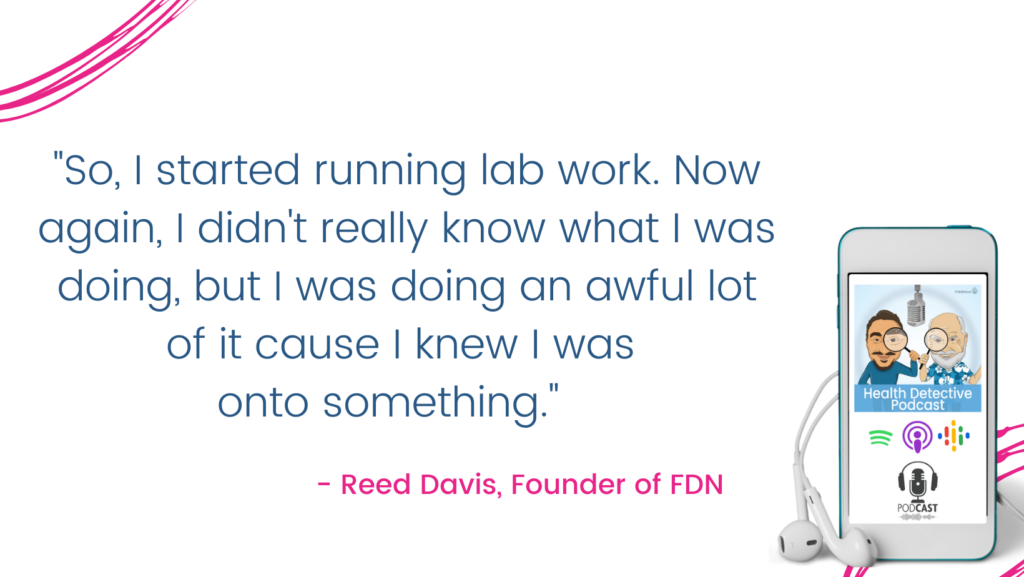
I thought it was a rip off. A lot of those practitioners making all this money and yet just going, oh, well, we tried, that wasn’t gonna work for me. So, I started running lab work. Now again, I didn’t really know what I was doing, but I was doing an awful lot of it cause I knew I was onto something.
One of the very first cases was a lady who came in the office. I remember her name; I remember what she looks like. She’d been coming in for chiropractic. I would walk her back to the treatment room and give her some pressure point therapy, which I was trained in and a heat pack. Then the doctor would come in and do the adjusting. It was working really well on that kind of a problem. But I could tell she was feeling sad, and I said, what’s going on? She said, Reed, it’s this weight. I’m 40 pounds overweight and I’m so frustrated.
Me, happy me. Well, look, what can we do here? Oh, there’s nothing I can do. I’ve been on this medication for the hives. She had hives on her skin. I’ve been on this medication for two years and it makes me fat. I went to my doctor the other day, she told me. He said, well lady, have your choice, you can be fat, or you can have the hives, take your pick, which is upsetting enough. But then she said to him, that’s pretty depressing. He says, well, we’ll be happy to write you a prescription for antidepressants.
Evan Transue: Wow.
Within Two Weeks Using the FDN System

Reed Davis: You know, making things even worse. So, she was just down. Now when I looked at her then, and I said, well, did you ever try to find out why you get the hives? Her head snapped around so fast I thought she wouldn’t need her chiropractic adjustment that day. She says, well, what do you mean? I said, why don’t we just find out why you get the hives, and we’ll deal with it on that level? She goes, well, I didn’t know you could do that; no one told me. Two years, she’d been suffering on this medication, gaining all this weight and now getting depressed.
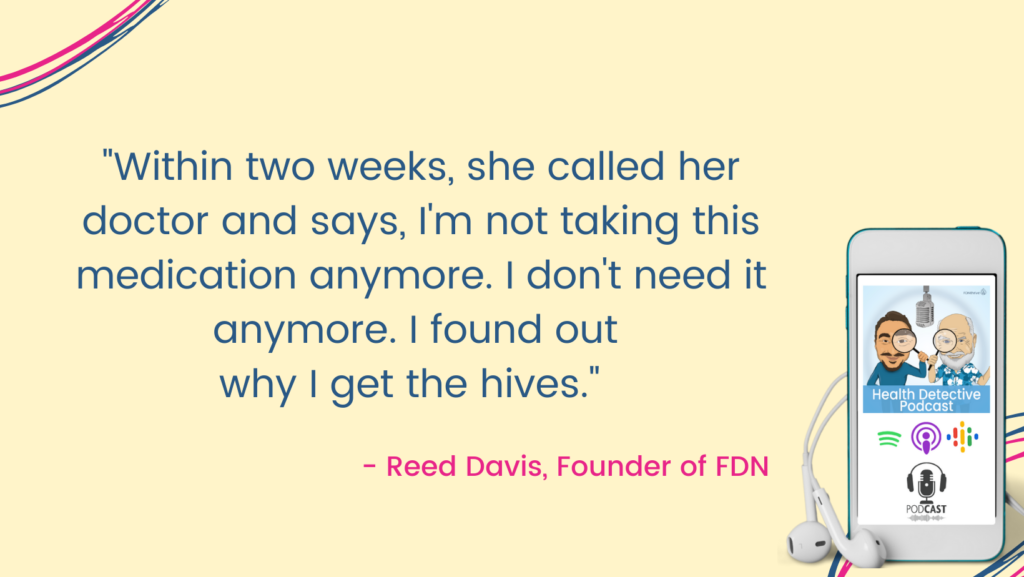
Fast forward to two weeks after we got her test results back for some food sensitivities, environmental illness testing. It was very easy testing to do. Had the kids. Sent her home with the kids. She got the kids done. We give her her results, go over a few lifestyle factors, especially diet. Within two weeks, she called her doctor and says, I’m not taking this medication anymore. I don’t need it anymore. I found out why I get the hives.
Within another couple of weeks, she’d lost weight and she was doing two things she had not done in two years: take hot showers and work out to the point of perspiration, which she couldn’t do even on the medication.
The FDN System Looks for the Underlying Cause
[00:13:34] Evan Transue: Like a histamine reaction, I guess.
[00:13:36] Reed Davis: Regardless, it was just the fact that she had never even looked for the underlying cause. Her physician was totally happy to keep her on the medication and monitor her, that kind of thing. Like you’re still suffering? Yes, I’m still suffering. Keep taking your medicine, you know. Oh my God, this was just the antithesis of what we were all about at the wellness center.

[00:13:56] Evan Transue: That really shows the fundamental problem that’s going on. It’s not even focused on the “why,” like the allopathic care system. It’s never focused on what’s actually happening.
No Amount of Medication Can Fix Pushing All the Limits
With my mom, when she started presenting with these symptoms, it doesn’t take a rocket scientist to figure out. My mom was hustler, man. She grew up in a very rough area. She’s never went to college or anything, was doing the waitress thing, and then, would go and start her own restaurant at night.
So, there was a time in her life where she was up about 19/20 hours a day, taking care of us, working as a waitress. My dad’s working seven days a week as a landscaper. She’s starting this restaurant with my aunt. No one thinks to say, hey, maybe that’s why you’re not doing so well health-wise right now. It immediately just jumps to, here’s a medication to feel better.
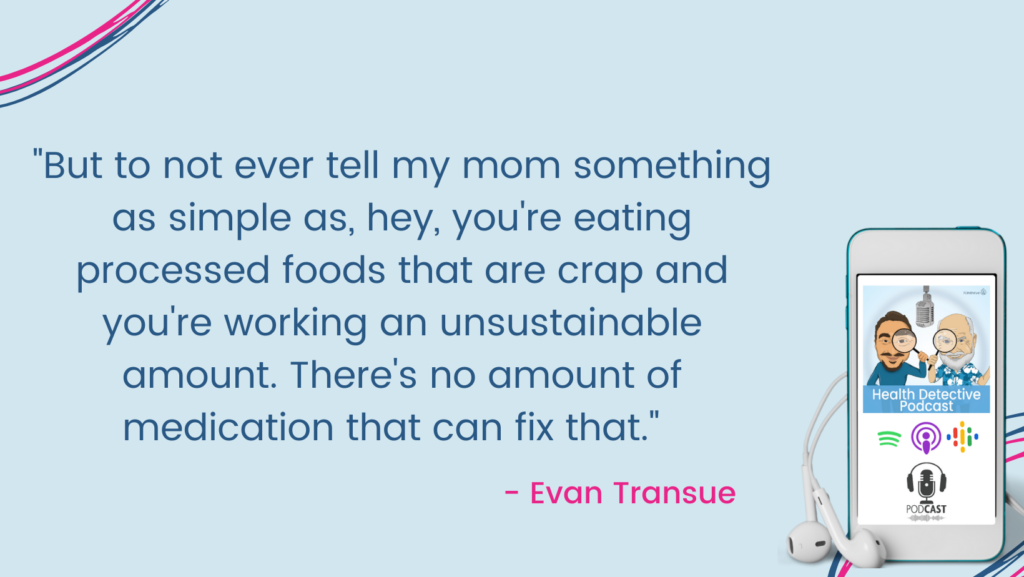
And we’re not sadistic people. We want them to feel better, you know. You’ve got to use the medication for a little bit, that’s great. But to not ever tell my mom something as simple as, hey, you’re eating processed foods that are crap and you’re working an unsustainable amount. There’s no amount of medication that can fix that. You’re always going to have an issue there and you keep pushing that. Sure. Maybe we can band-aid it with the medication, but it’s going to manifest as something else eventually, if you give it enough time.
The FDN System Asks Why
[00:14:59] Reed Davis: Yes. I’ll give you another example similar to what you’re saying. I was coaching football at the time too. I coached youth football; it was one of my favorite things to do. I’m out there with the kids, and this lady comes up to me, one of the moms, and says, Billy, for namesake, he can’t come to practice on Wednesday night because he’s having asthma attacks.
That illustrates a couple of things. One is, that he was on this inhaler, and you can’t bring an inhaler to practice with it. It wasn’t allowed by the league. If you need an inhaler, you got to sit off to the side. That inhaler is important. That’s relief care. But nobody was even looking for what was really the antagonist.

So, she goes, can he not come Wednesday night for practice, but still play on Saturday? And I said, no. Now this is a good kid. This is a good little athlete. You want him. He’s an impact player when he’s there. So, I said, sorry, no, he won’t know the plays. It’s not fair to the other kids, and so on. We don’t do that. She was depressed. You know, I mean look, did you ever try to find out why he’s having these asthma attacks? I don’t have any guarantees that we’re going to discover. I said, but there’s at least a couple of things you can look into. Ran practically the same labs that we ran on the first lady for her hives.
The FDN System Turns Lives Around
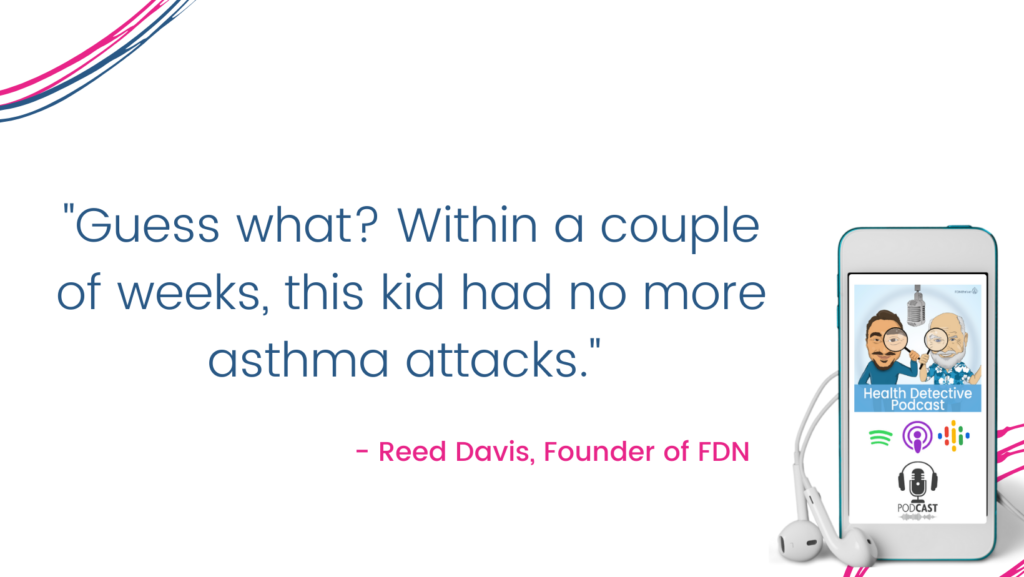
Guess what? Within a couple of weeks, this kid had no more asthma attacks. Now she brought me, his sisters and his brother. Four kids. Had her husband and did the labs herself because they wanted to purify. They learned something and they realized that look, we can be in control. There isn’t just take meds for the symptoms.
Most of the listeners are probably beyond that anyway, but that was just another one of those heartwarming stories that I continued to hear over and over. That father, when I saw him at football games, would come up and thank me. He would tell the other fathers, like, Reed really helped me and my son, got them on the field.
Now that kid was maybe nine then. I kept watching him go through high school and going to college and playing football. So, we turned a life around and that’s the kind of thing that never goes away – that feeling. It’s why we work and do what we do.
Kids Are Vulnerable and Dependent
[00:17:09] Evan Transue: Yeah. Well, I love that. My next question for you is actually going to be, what’s a great one involving a kid, because first of all, it’s usually not their fault at all. It’s one thing if a fifty-year-old adult is eating McDonald’s every single day and refuses to change even after you tell them, hey, maybe that’s not the best thing to be doing for your health. But a kid, man, that’s like six, seven, eight years old, they don’t know any better. They’re born into wherever they’re born into and they’re trying their best.
And the worst part is the parents are usually trying their best. My parents didn’t want me to have panic attacks or anything. They were doing the best that they could with the information they had. And you had to think about how one little thing could have switched it around would have been great. As you say, in the course, you know, we have this vital reserve to us. Kids have so much of that, that you just do a few things right, only takes a couple of weeks sometimes and that kid’s bouncing back to normal.
The FDN System Considers the List of Factors
[00:17:48] Reed Davis: Yes. It depends on the condition, how long has it been going on, how severe it is, and lots of factors. But sometimes it’s just really simple.
I got to give you another one because this one is almost laughable funny. So, this lady is coming in the office and she’s getting chiropractic and some of my nutritional wizardry. And she’s feeling better, more energy, better sleep, building some muscles. She was getting out of pain, of course, from her chiropractic stuff, some injuries she’d been in and things. She looked at me desperately one day, and says, Reed, is there any chance you work with children?

I said, yeah, I work with them every day. I coach football, you know, I’ve helped kids on the team and things like that. She goes, well, I have a problem. The teachers are saying that my son is misbehaving, he needs drugs. They want to put him on drugs. So, I said to her, well, do you think he has a drug deficiency?
And she said, no, I don’t think that’s his problem at all. I said, well, let’s run a couple of labs. We’ll see. I have no guarantees. Just like with the asthma youngster, there’s no guarantees. But there’s such reasonable expectations that improvements can be made if you can find out what the underlying causal factors are.
It Has Everything to Do with Removing the Stressors
So, this young man, we changed his diet and some other things, his sleep patterns and stuff. Within two or three weeks, I got a call from the principal of the school. He had tracked me down through the mom. I need to talk to this guy. He said, what did you put Billy on? Like as if I’d given him some pills.
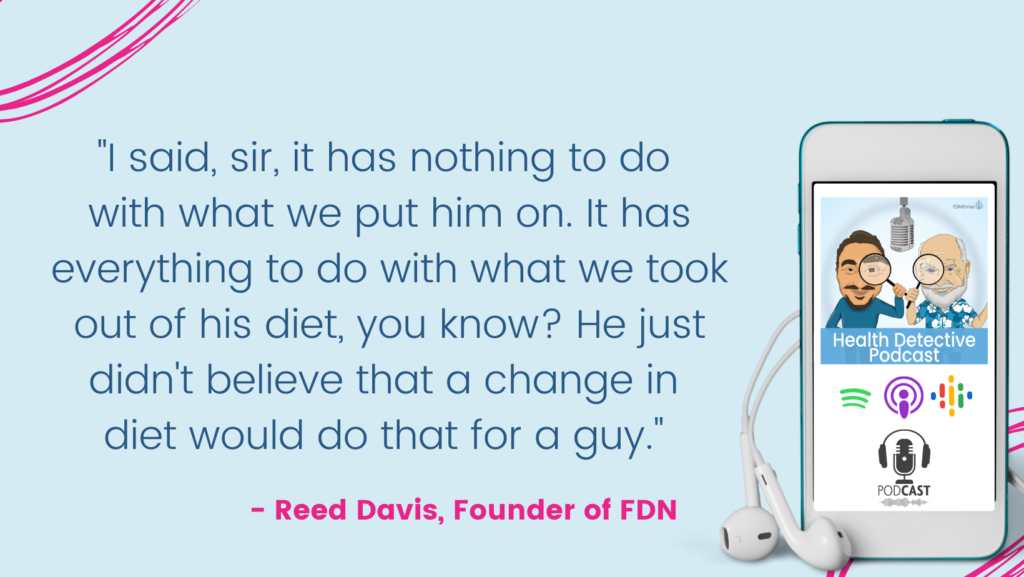
So, I said, sir, it has nothing to do with what we put him on. It has everything to do with what we took out of his diet, you know? He just didn’t believe that a change in diet would do that for a guy.
Evan Transue: Oh, so he was calling pretty skeptical?
Reed Davis: He wanted to know, what’d you put him on, as if there was some magic drug that had completely changed this kid’s behavior. He had been poking around and couldn’t stay still and wasn’t paying attention. And he was bothering other kids, like physically poking around, and now all of a sudden, he’s sitting there paying attention, listening to the teacher go through whatever she’s going through. And she’s the one that wanted to put them on drugs because she wanted the behavior regardless of how good that would work out. Thank goodness that boy’s mom didn’t want to put him on the drug.
Evan Transue: Wow.
Reed Davis: Anyway, that was another very heartwarming touching story that you never forget. That never allows you to give up on any person, young, middle, old, whatever it is.
Teaching the FDN System to Others
[00:20:17] Evan Transue: So, you went through this for years; you’re getting all these amazing stories. Where did you get to the point that, I want to teach this to other people? We have FDNthrive and that’s for the person that wants to come in and work with an FDN, right? Then of course, for the people that want to do this as a career, you can do the FDN training like I did. When did you decide, I need to start teaching this stuff?

[00:20:35] Reed Davis: I’d been in the clinic for nine years working like that. And I was out lecturing all the time. That’s how I built my practice; and how I built up the office was by going out and lecturing. I was teaching in libraries, grocery stores, clubs, we would do luncheons, we would do meet and greet, all kinds of things, parent/teacher associations there. I was just building my practice.
The only reason I developed FDN was to build our clinic. I just wanted to do some good. Then people started coming up to me and saying, you should be teaching the other doctors. So, I remember this one lady, about 90, “you should be teaching the doctor.”
Deputizing Others into The FDN System
I thought, well, that’s way above my station in life. I’m just trying to help you and the other people at the lecture here. But I kept hearing that over and over again in my head. Then one day I’m driving home from one of my lectures and I just got a handful of clients to sign up because everyone wants to do this work.
They get really excited when they know that they can get to the underlying cause and condition, or at least there’s a reasonable alternative path here. I got a call from the lab director of one of the labs that was my most popular lab. I was running hundreds and hundreds of these labs; and he calls me up and he goes, who the hell are you?
I said, it’s Reed, you know, you’re the one that called me. He said, well, how in the hell are you doing so much lab work? I said, what do you mean? He goes, you do more lab work than a famous doctor, I won’t name, and he has five doctors working for him. How many doctors work at your place?
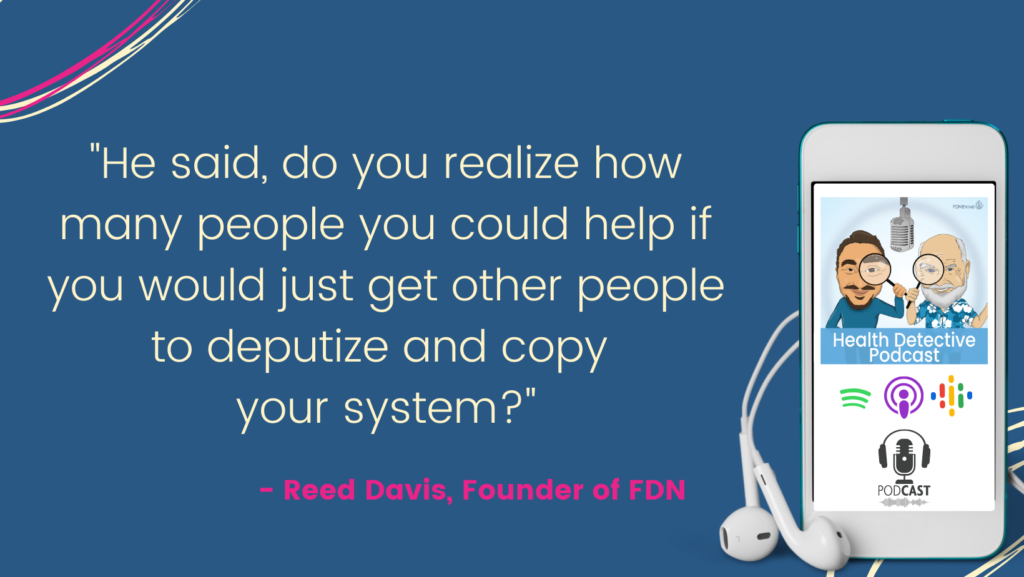
I said, there’s a chiropractor and an acupuncturist, but I’m the only one running labs. I’m not even a physician. I’m just doing it under their licensure. And he said, well, whatever you’re doing, you need to be teaching it to others. He said, do you realize how many people you could help if you would just get other people to deputize and copy your system?

And I thought, yeah, here I am helping, over a number of years, a few thousand people; but what if I did deputize others? So, I started putting a class together and the rest is kind of history.
FDNthrive was Birthed Out of FDN
You know, from that first class I became a teacher, I let my practice drop away for the most part until we got to FDNthrive. That’s like the new practice.
[00:22:47] Evan Transue: Well, and we need it because people were calling the course. The course is intense, man. You’re going to learn a lot of stuff. You get to be a practitioner.
Reed Davis: Very robust.
Evan Transue: And that’s wonderful. That’s for some people, but we also need other jobs out there in the world.
And some people were calling just saying, hey, I want to work with an FDN. Where can I go for that? And now, to be able to offer this to the public, and of course it helps out the graduates as well, but that’s a separate thing. The reason I was trying to segue into that is because I’m curious if anything sticks out of the top of your head, do you remember any graduates that went through where their health transformation was amazing?
Because as Reed was just talking about, the whole reason FDNthrive was founded is so that we have a way to serve the public. But there was people even like myself, when I went through the course, I didn’t necessarily say, oh, I can’t wait to be an FDN.
I saw a system at the time that I believed was good. I talked to Jenn Malecha, as I think you remember. And of course, you talk to Jenn Malecha on the phone, you’re going to be excited about FDN pretty quick. So, she got me involved. I was going through for my own health and then I realized, wow, I actually would love to do something with this in one way or another.
FDN Grads Success Stories
So, I’m curious, especially those initial grads, were there people going through that they’re wanting to do this as work, but they also have their own health challenges? And who might really stick out with that? Cause I even have a list of those people in my head.
[00:23:54] Reed Davis: Well, you just mentioned one of the top people, Jenn Malecha, and she has an amazing story. She was a personal trainer, did a little nutrition, but she had her own health problems. She had thyroid stuff. Matter of fact, you can go back in the episodes and find when Jenn was on.
Evan Transue: Episode six, I believe.
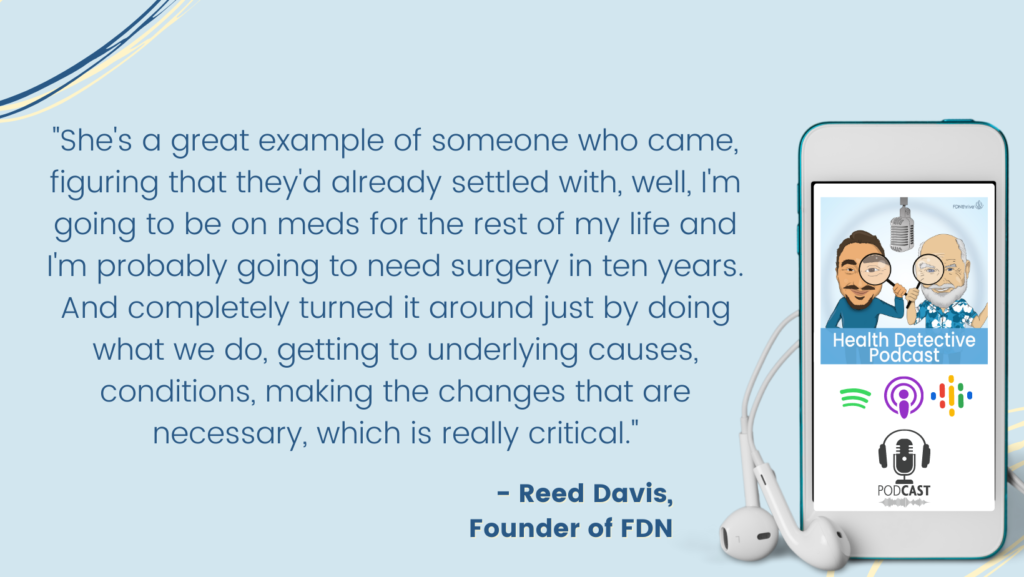
Reed Davis: She’s a great example of someone who came, figuring that they’d already settled with, well, I’m going to be on meds for the rest of my life and I’m probably going to need surgery in ten years. And completely turned it around just by doing what we do, getting to underlying causes, conditions, making the changes that are necessary, which is really critical. There’s no magic pill, like that principal of the school, “what did you put him on?”
There is no magic pill. There’s work to be done, but there’s people that will tell you exactly what needs to be done and walk you down the path, if you will, or help you climb the stairs is a better analogy. I love the analogy of we’re all on this pathway together. No one’s perfectly healthy. In my twenty-two years in this field, I don’t know anyone at the top of the stairs. Some just step more steps to take than others.
Growing the FDN System
As long as you keep making those steps, you’re going to do all right. And for some people, they go the first few steps, and they feel great. You go a few more steps, they feel amazing. And now they’re healthy and happy teaching others to do the same thing.

So, as we go up the stairs, we learn to reach down and bring others up that stairway to health, and then we stay on the path together. So, Jenn was a good example, but there’s so many others. In the very first FDN class, so it’s funny to think about it now cause we’re in 50 countries, we have thousands of graduates.
The first class in July of 2008, there was 19 people. I stood in front of those 19 people and went over 200 slides in two days. That was FDN. There was no practical exams and exercises. It was just not the robust course that it is today. It was more or less an introduction.
FDN Labs: Results Don’t Lie
And still, I remember a lady standing up. Because I had them run some labs before the class. We signed them up for the class, sent out some lab kits, and they all came and got their results.
Evan Transue: Wow.
Reed Davis: All at once, 19 people. And this one lady thought she was in great shape. She was a personal trainer. She was also a chef like a really good natural chef kind of person.
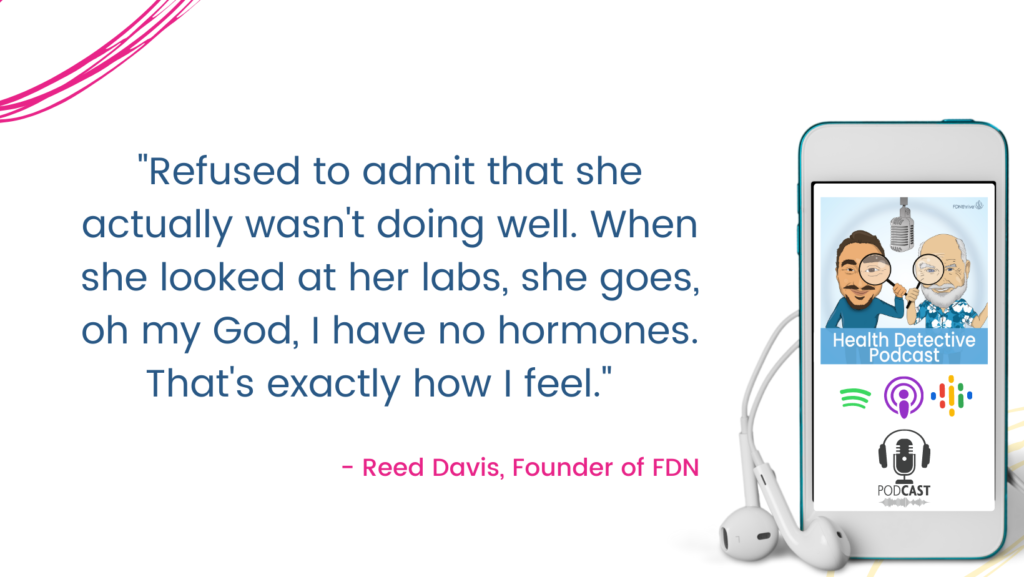
She looked good or she wasn’t overweight or anything. But when she looked at her labs, she realized that all of that vim and vigor was just mental attitude. It was that she had such a positive attitude. Refused to admit that she actually wasn’t doing well. When she looked at her labs, she goes, oh my God, I have no hormones. That’s exactly how I feel. Like it’s even faking it, her exuberance and her sex drive and all of these things that really were non-existent. She was a great faker. And when she looked at the realities that come with this lab data, it really gets you straight. We’re not trying to bring anyone down, but you get the point I’m trying to make.
[00:26:49] Evan Transue: Absolutely. I’ll never forget. I have an acupuncturist, great guy, and we always have really objective conversations with each other. When I first brought this concept to him, he had said, I think that’s really cool what you’re doing, Ev. But aren’t you worried that maybe people get these labs back and now they have something in their head that wasn’t there before?
Sick Enough to Receive Validation from Lab Data

I said, I’m so glad that you’ve never been sick enough that you view the labs that way. Because for someone like me or like that woman, it’s not putting in your head, it’s validating. I’m like, why have I felt like I can’t keep up my whole life? Not that we were aspiring for people to do this, but I was 21. It would have been cool to go out and have a drink with my friends.
My buddy can go kill half a handle of vodka in one night, four hours of sleep and goes, works the shift the next day. If I had, I’m not kidding, one or two drinks, I have a migraine the whole next day. I’m hung over. I feel terrible. That’s kind of the whole point. It’s like, no, for me that was validating because I know something’s bad.
I need to see what’s actually going on because when I go to the doctor, they’re not telling me what exactly what’s happening. This was a while ago; I wouldn’t expect you to remember this. I was in the exhaustive phase of HPA axis dysfunction as a twenty-one-year-old male. I’m already tanked out.
[00:27:49] Reed Davis: Well, we find people younger than that even. When you’re going through puberty’s probably not a good time to run the hormone test. So, we would run the food sensitivity and the gut test and all that. But you had a lot of things going on. We generally run five labs on every person.
A Whole Constellation of Healing Opportunities
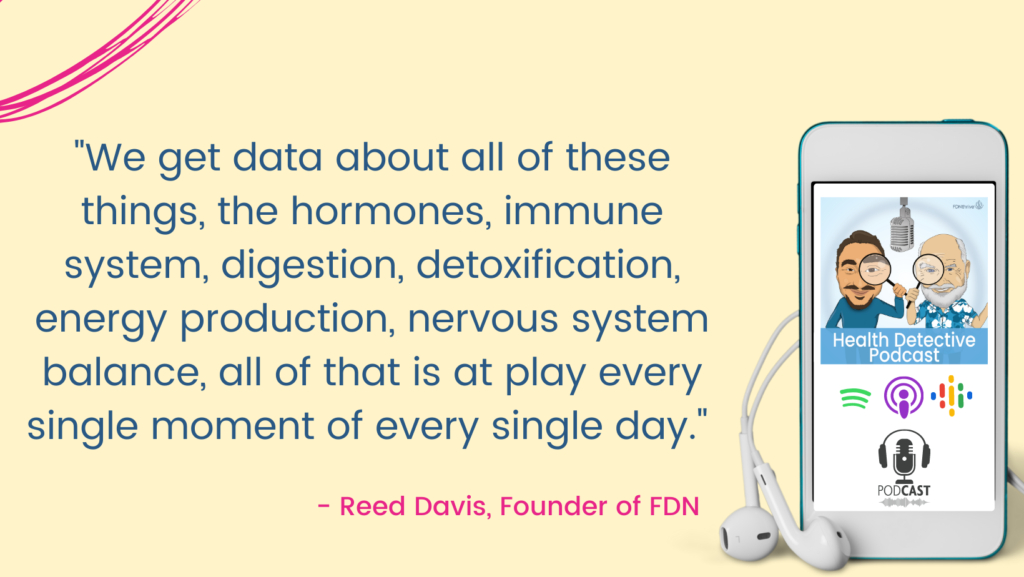
That gives us a whole constellation of healing opportunities. That’s how we can work on the entire person and every cell, tissue, organ, system, the entire organism at once. Cause we get data about all of these things, the hormones, immune system, digestion, detoxification, energy production, nervous system balance, all of that is at play every single moment of every single day.
So, why would you single one thing out? Which is what’s wrong with standard medicine is that it singles things out. What’s your complaint? Migraines. So, here’s some medicine for your migraines. They’ve even got them now that kind of prevent migraines from happening. Or if you get one, they can reduce the severity instead of being in a dark room with a pillow over your head for four or five days, it’s down to one day.
Well, that’s an improvement. But we would just say, well, let’s figure out why you get the migrants. And that might take an investigation. But the amount of suffering we relieve, and it does cost money, but it’s one of the best investments a person could possibly make.

Get these labs done. And like the lady who looked at her labs and admitted, oh, it’s so true. Oh my God. It’s true. Then she brought her positive intelligence that we’re going to change this. We’re going to do whatever it takes. And thank goodness, we don’t just figure out what’s wrong with people or what the healing opportunities are. We give them the entire lifestyle that they need, everything from, D.R.E.S.S. – Diet, Rest, Exercise, Stress reduction, Supplementation. It’s a holistic, environmentally sound program for anybody, any family, any group.
The FDN System Runs All the Labs
[00:29:39] Evan Transue: Well, it’s kind of ironic because a lot of the Type A, so overrepresented in the people who go to FDN just because we burn ourselves out first. But then the good news is we get these labs back and we’ll do it better than anyone because we’re Type A. I’ll do everything I need to do with my protocol and get that all better. It’s cool stuff. I love hearing this type of thing.
And I know for me, when I first got into this, it was just really inspiring to be able to hear that there was something different. There was a different path, and I know that’s the case for everyone out there. Now, one thing I have to go to, and this is opportunistic. I wasn’t even planning on asking this today. I should have thought about this because we have the founder on.
There are so many people that call FDNthrive and they love it. This makes sense. This is great. We talk about, hey, we use these labs and we do it all the time. And they’re like, well, listen, I just have an 8 out of 10 stomach pain. I don’t need to run the hormone test. Well, why do I need the food sensitivities? I don’t need that. I know that you did already explain it, but I think this is worth reiterating. Because I’m going to show people this part when they ask. Why does someone coming in with a cross set of symptoms or an illness or whatever, need to run all of those labs, even though they think, oh, well, it’s just my stomach hurting. I just need to run a gut test or something. Why does it need to be all of these?
Symptoms Can Be Far Removed from the Causes
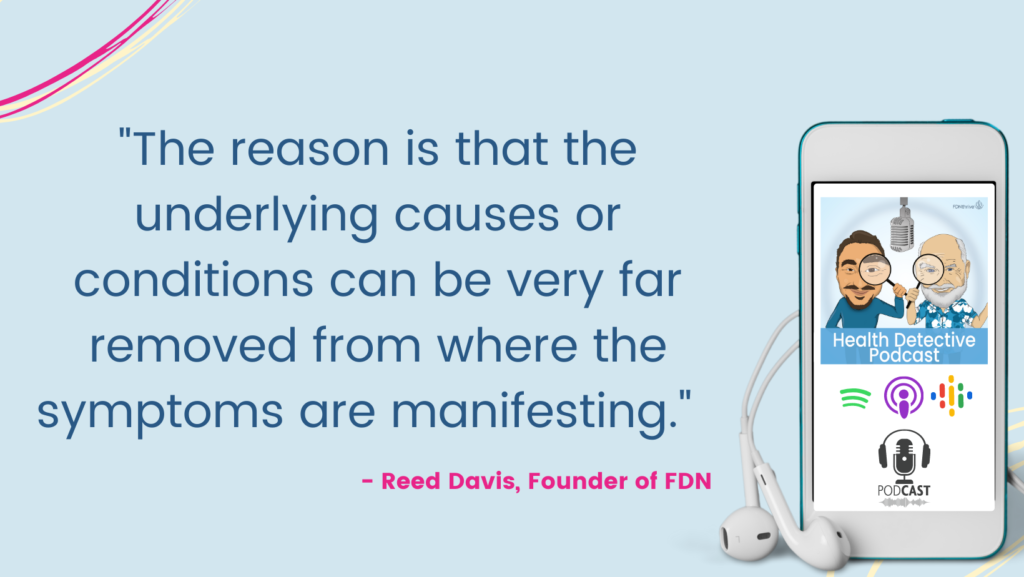
[00:30:45] Reed Davis: The reason is that the underlying causes or conditions can be very far removed from where the symptoms are manifesting. As a matter of fact, it’s not only that there are various individual causes or causal factors, those upstream where the symptoms appear are crashing into each other. So, they’re having an effect upon each other. Now there’s some of those causal factors can’t be measured directly. They’re only known from an indirect measurement.
FDN Detects H.I.D.D.E.N. Stressors
So, we just found over an 8/9-year period of time that if you look at the hormones, the immune, digestive, detoxification, it’s not any five labs we asked you to run. It’s very specific. Let’s look at hormones, immune, digestion, detoxification, energy production, and nervous system balance.
It’s your autonomic; you mentioned sympathetic. I’m actually more parasympathetic. It’s why I can handle a lot. I’m like the tortoise, I do just keep going and going and going. I never burn out. I do need rest. I go get it. And I come back the next day and I’m ready to go at my pace. It doesn’t mean I don’t get excited and get into the “A thing” sometimes. But I’m much more of a laid-back personality.
But all of those have to be balanced. You don’t want to be too much laid back either. You end up like a slug, you know? I could sit on a fence for hours looking at the lake and the breeze and the trees and the birds and the bees, and really that kind of a guy. You don’t want to overdo that either.
You don’t want to be overly parasympathetic or sympathetic. You want to strengthen the weaker side. That’s the kind of analogies we do. What type are you? We’re going to strengthen the other side. If it’s digestion, if you’re not breaking down, absorbing your minerals and your vitamins and your phytonutrients and essential fatty acids, antioxidants and things, you won’t have the raw materials you need in your body. We look at all of these things. H-I-D-D-E-N, hormone, immune, digestion, and so on. We don’t know which one is involved or contributing to the chaos (we call it “metabolic chaos”), in your body that is leading to those symptoms.
The FDN System Recognizes Metabolic Individuality

So, you have all of these causal factors streaming into the body. And if they’re not immediately resolved, like if you’re in a fight, you want to get out of the fight. But otherwise, the kind of stress we’re under today is so chronic. We don’t recognize, we can’t get out of it right away. We don’t resolve it immediately. It just goes on and on and on. Pretty soon that goes downstream. And if you use the stream analogy, it’s like your organs, your cells, your tissues, your system, they’re like the rocks in the stream and everything’s crashing together.
Now, there’s a lot of metabolic individuality involved. We’re all so different that the same stressors up here could cause migraines in this person, asthma in that person, joint aches and pains in the next person, gut inflammation in the next person. What we address is as many of the healing opportunities as we can, and we let the chips fall where they may. Like you said in the very beginning, I think, I appreciated that. You said the body knows what to do. You don’t have to teach any cells what their job is.
[00:33:53] Evan Transue: This is the first thing I explain to someone if we’re talking on the phone about this. It’s simple, but it’s conceptually exactly the same thing. If I get a paper cut. Stop messing with the cut. Don’t pick the scab. That’s it, it heals itself. You know, the body wants to be in a state of health by default. Now of course it’s a little more complicated than a paper cut because that’s easy to remove.
Why The FDN System Uses These Five Labs
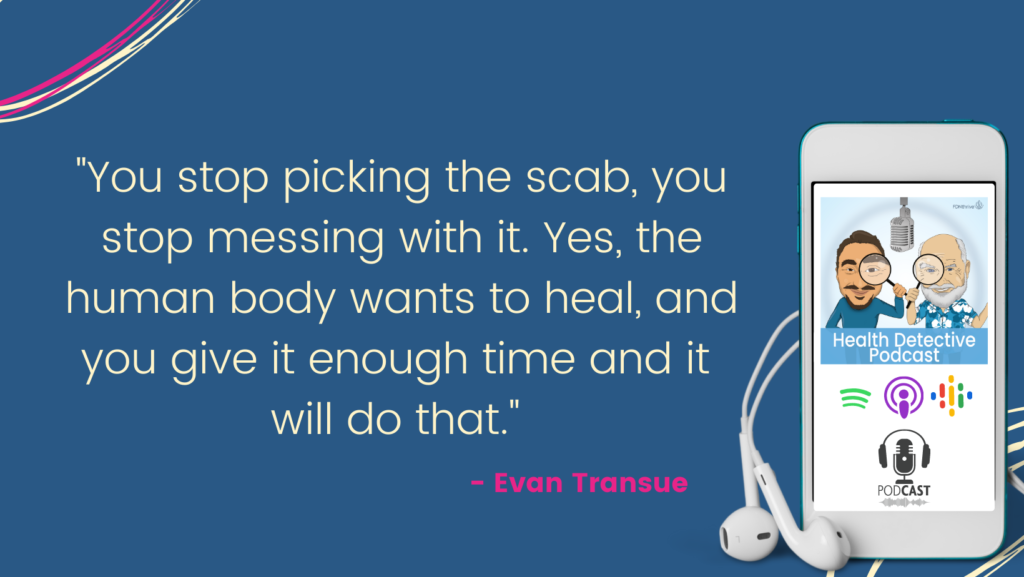
Stop messing with this paper, and it has the sharper edge, whatever. Use something different or just stop being an idiot and you won’t cut your finger. Then we have the gut bugs, we have the food sensitivities. When we have all these other things, it’s a little more complicated, but it’s the same thing. You stop picking the scab, you stop messing with it. Yes, the human body wants to heal, and you give it enough time and it will do that. In fact, again, we’re really lucky that it will heal a lot faster than it should seemingly, considering how long you’ve been sick. I think that’s a beautiful thing that that even happens.
Then I guess my part B to that question, because all right, I get now why we use these five labs. So, people will call sometimes like, well, why not heavy metal testing or why not this test? And there’s a lot of great fancy tests out there that we’re not even saying are bad. I mean, FDNs have access to a lot of these things, but if you don’t do this core stuff first, I feel like it’s almost like a waste of time to be going to that extra stuff.

You might have a better way to explain this to me. I always explain to someone, if they call asking a question like that, I’m like, well, if you work on this core stuff, you usually don’t need those labs because that stuff kind of evens itself out. Of course, there’s rare cases where someone has a really weird, I’ve seen this myself, a super weird water in their house, and yes, they do have insanely high levels of a metal. The water’s the problem, not any of the other stuff.
FDN System – Holistic Grounding Program
How do you explain that to someone where we have hundreds of labs we can run today, every different doctor has a different lab that they run and that they love, and we stick to this core system for almost 20 years now? Why don’t we need more labs per say?
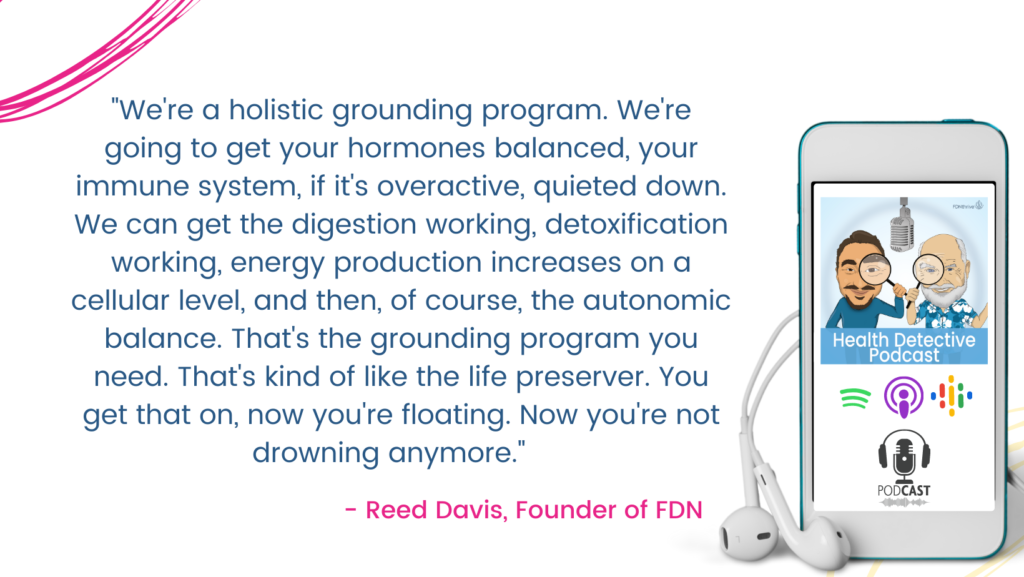
[00:35:34] Reed Davis: The other labs can come in handy as troubleshooting techniques or methods. You have to start with the core, the basic stuff. We call it the grounding program. We’re a holistic grounding program. We’re going to get your hormones balanced, your immune system, if it’s overactive, quieted down. We can get the digestion working, detoxification working, energy production increases on a cellular level, and then, of course, the autonomic balance. That’s the grounding program you need. That’s kind of like the life preserver. You get that on, now you’re floating. Now you’re not drowning anymore.
You’re not going to go down three times or any of that stuff. So now you’ve got your bearings, and you have something. You feel so much better. You can start to zero in if it’s a heavy metals problem. You might need your mercury removed. But we wouldn’t just go up to someone who had a bunch of symptoms and say, oh, it’s your mercury. Get your mercury removed. We don’t want to pick on one thing.
FDN Focuses on the Person Not the Paper
That’s another thing that’s built into the modern American medical system and around the world, physicians will listen to you, and a lot of even health coaches who aren’t doing our system, they’re doing a different system, functional medicine practitioners, they say, what are your symptoms?
Well, if it was my hair’s thinning, I’m overweight and I can’t seem to lose it no matter how much exercise I do, my hands and my feet feel cold or even numb at times, I’m constipated, my skin seems to be thinning. Well, that sounds like a thyroid problem.

Then the person will run a thyroid test and then, oh, look, your thyroid is low. Hypothyroidism. I found your problem and pat myself on the back. Here’s your prescription. We’re going to get those test results in shape. We’re going to raise this, lower that, whatever it might be. I call that treating the paper for one thing.
But what happens if that person does feel a little bit better? Well, you’re going to feel a bit better if your thyroid was low and now it’s back. But no one’s asking the question, why was my thyroid underactive? Is there something wrong with my thyroid? Typically, no.
They call hypothyroidism idiopathic; we don’t know the cause. Well, that’s frankly bull. There’s lots of causes why your thyroid would go into remission a little bit. It’s going to slow down to save your life. You’re under so much stress that your body wants to conserve resources.
High thyroid will burn up your resources, so it goes into hibernation as a normal, natural response – an adaptive response – to the type of stress that you’re throwing at it. If you’re hypo-thyroid, it’s probably some form of stressors and it’s actually doing the right thing.
The FDN System Gets the HIDDEN Stressors in Shape
But you feel bad because of it, again, the thinning hair and the constipation and the typical, traditionally reliable, cluster symptoms, sounds like thyroid. And how many people do you think are on thyroid medication because of that? It’s in the 20, 30, 40, 50 million people. I’m sure it’s up there somewhere, who, guess what, aren’t looking for why they’re hypothyroid. And there is such a thing as deficiencies in the diet, like iodine deficiencies. It’s so rare. It’s so rare.
And there’s some other possible issues where it borders on medical. But for the most case, 80% of the cases that I’ve seen, it’s been that we resolve the stressful factors, get the H.I.D.D…, get all that in shape and the thyroid goes back to normal, or you at least need a lot less thyroid support and even just switch to the natural and you don’t need any patented medicine.
[00:39:12] Evan Transue: I think that’s a good explanation.
[00:39:13] Reed Davis: One example. Another is gut problems. So, people would have diarrhea or constipation or alternating, gas, bloating, heartburn, indigestion, and so on. Some practitioner might go, it sounds like SIBO, or it sounds like a bug. You have a bug. We’re going to run a stool test, one test. God forbid, they find a parasite or some bacteria overgrowth. They’re gonna say to that person, I found your problem. And they start treating that one thing, that bug, you know antibiotics, anti-parasitics or whatever it might be. And that person feels a little bit better.
Go Above with FDN
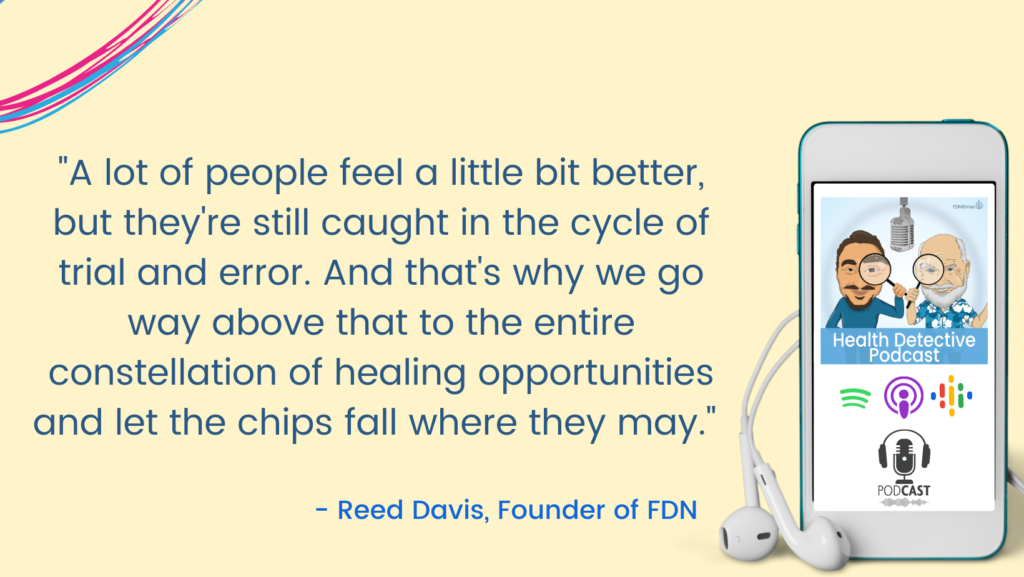
But guess what? In a few months, they’re going to some other doctor, they got the same problems again, because they didn’t address all the causal factors, the food sensitivities and other things in their environment and the dysbiosis that is chronic and the candida overgrowth and the things. We can’t just say, well, it sounds like bugs. Do a bug test. It sounds like thyroid, do a thyroid test, or even if it sounds like adrenal, and run an adrenal test.
That system doesn’t work as well. It gets people making a lot of money, doing it. A lot of people feel a little bit better, but they’re still caught in the cycle of trial and error. And that’s why we go way above that to the entire constellation of healing opportunities and let the chips fall where they may.
[00:40:27] Evan Transue: And people are exhausted. A lot of people when they’re calling us, they’re saying they don’t want to hear again, oh, we know exactly what’s wrong with you, upfront, at least. Right? Sounds like this. It sounds like that. Because now the market is so oversaturated with it, even in the functional and natural space, they’re exhausted with it. I had that happen in probably the worst way possible. And I’ll explain what I mean.
Use Testing Appropriately
I’ll just say a doctor, naturopathic doctor, in my vicinity of the world, run a stool test on me because she believed all this stuff that I dealt with my whole life, which you know my story well enough, was just a gut bug, that’s the only thing. So, she runs a test.
This gets even worse. She doesn’t find the bug on the test and still gives me the supplements for that bug. Why did we run the test then? If all you were going to do at the end of the day is run the things for the bug, regardless. She was going to do that anyway, why did I need to spend $300, $400 on this test?
We will always get use out of any test that we get out of FDN, even if it looks good. We’re trained to use that appropriately.
Clinical Correlation Is Crucial
[00:41:22] Reed Davis: Well, there’s some licenser that some practitioners have to use their clinical impression, which I wanted to go back to for a second, anyway. Clinical correlation is the key to lab explanations. If I’m going to explain these lab tests results to you, they have to relate to you.

So, you can say, well, Mrs. Smith, here’s your ratio of estrogen to progesterone or whatever it is. And typically, with people like that, they have tender breasts, and they feel a little bit depressed, and their menses is a little uncomfortable, PMS. And guess what they do? That’s me. So, the lab results have to explain the person. That’s called clinical correlation. For the most part that’s true. But some practitioners, especially in Western medicine, they can look at the tests and ignore it and take their clinical impression over whatever data they collected, and some health coaches do too. So, that’s not entirely illegitimate, but we would prefer not to have to do that.
Evan Transue: Right.
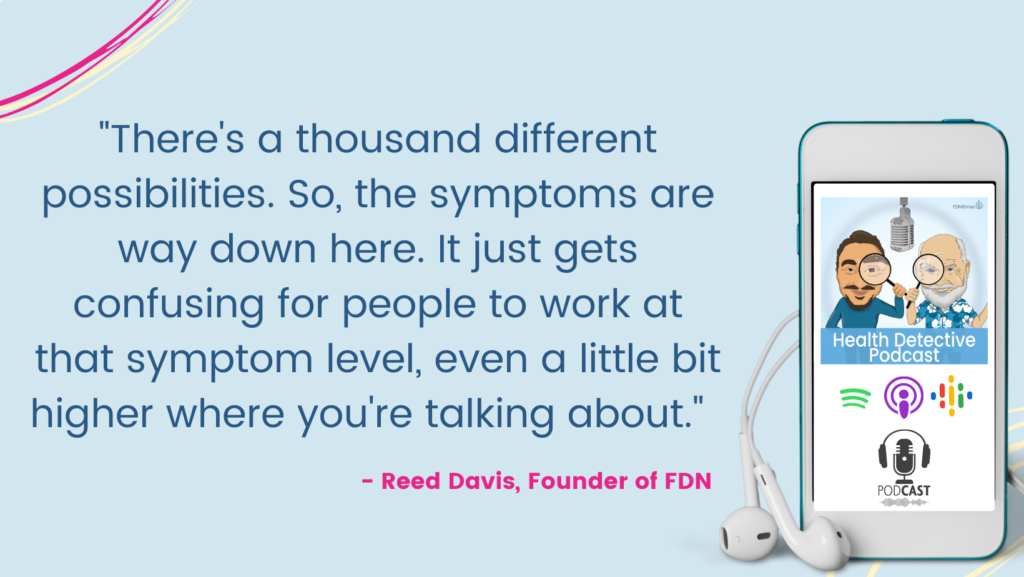
Reed Davis: Remember, if you’re working at this level up here, all these causal factors, and we know they’re crashing into each other and filtering down through individual metabolic weaknesses, weak links in metabolism, there’s a thousand different possibilities. So, the symptoms are way down here. It just gets confusing for people to work at that symptom level, even a little bit higher where you’re talking about. I’m just going to run a stool test or I’m just going to run a thyroid test. We got to go way up because we don’t want to risk. And that’s the investment people are making when they come to FDNthrive.
The FDN System Moves Clients in the Right Direction

[00:42:52] Evan Transue: And I will send this to them every time, because once they get it, everyone is willing to spend the money on the labs, which is so much less than they spent over the years anyway, so much less. But so many of these people spend tens of thousands of dollars. It’s ridiculous. But the point is, they’re burnt out like we said, because they’ve been to so many different places. No one has ever done FDN and gotten worse. You’re not going to get worse from this. You’re going to at least move in the right direction like you said. No guarantees, but reasonable expectations. I know. I find, generally speaking, that of all the people I’ve interviewed, they’re doing pretty darn well after doing this.
More FDN Success Stories
I’m not going to go into the full stories. You guys can listen to the episodes, but of course today, one of the core themes was talking about some of the most impressive stories that we’ve ever heard. I’ve been so lucky to do the podcast because now it’s not like I didn’t know FDNs before, but I’m talking to them about their deepest stuff on this podcast.
One of the coolest ones, I know you know her very well, Heather Cooan. Heather Cooan dealt with lichen sclerosus for almost 30 years, an autoimmune disease in the vaginal region. And she shared all this tough stuff, man. Yeah. She dealt with that since about seven, eight years old.
No one diagnosed this until 30 years later, she figured it out. She’s the one that’s doing her own research and getting it under control. And by the time she gets there, she also finds out that she’s looking at vulva cancer as well. She starts doing her own work. She’s her own detective, as we always say on the show and gets into FDN.
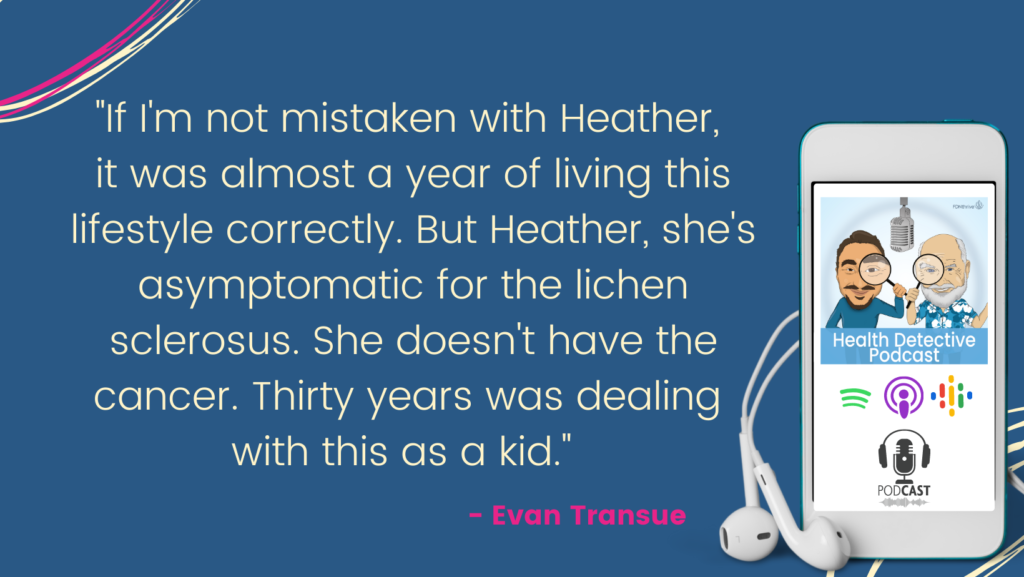
Now remember, she’s been dealing with this for 30 years. She’s been dealing with this as a kid, and she does the FDN work. Did this happen over a month? No, if I’m not mistaken with Heather, it was almost a year of living this lifestyle correctly. But Heather, she’s asymptomatic for the lichen sclerosus. She doesn’t have the cancer. Thirty years was dealing with this as a kid. Anyone in the Western world’s gonna say, oh, that’s just genetics. Sorry, that’s just the hand that you got dealt. Well, clearly, it’s not. There was stuff that was missing from day one. So, that was one of the coolest stories I’ve ever heard on here.
No Thyroid, No Problem for the FDN System
Of course, I’m biased, but just my own mom, she came on the podcast. She shared her story because, one time, several years back, we were arguing a lot. And I don’t want to argue with my mom. I love my mom and she loves me and it just wasn’t making sense.
I didn’t even get why she was arguing this stuff. And my dad pulled me aside the one day. Now my mom wasn’t even 50 at the time. And he’s like, Ev, you know, I think it’s probably like an early onset Alzheimer’s thing. Can we just stop arguing here because we’re probably going to be lucky to have her until 55 or 56 years old? Just let some things go. I knew she was sick, but when you see that your whole life, you don’t realize sometimes how bad the people are getting. I’m like, yeah, you’re right. It’s not worth arguing something so stupid. Just let it go.
Well, my mom made a huge shift about three years ago. Working with family can be tough. I sent her to Jenn at the time. We didn’t have FDNthrive, and she worked with Jenn for nine months, saved my mom’s life. My mom is completely back cognitively, best friends again, No arguing, no yelling. She’s doing spin classes for two hours twice a week. She’s working and doing things that she’s passionate about and actually wants to start a nonprofit now for autoimmune disease awareness. That could have never happened without the things at FDN.

This is a woman that’s been sick since 20 years old. Didn’t find this until, thyroid removed, Accutane. I mean, all this different stuff has happened to her, and it still worked well for her, even though she doesn’t have a thyroid.
Getting Results No One Else is Getting
Well, I haven’t said this publicly yet, so I’ll say this, this is cool. You’ll like this. You know and the audience might not know, in theory with a thyroidectomy, it is possible for a thyroid to regrow. It’s very rare though. Her endocrinologist recently thought that she had nodules growing. So, he got a scan on her and said, oh, it’s not a nodule. He’s like, I’ve only had this happen with one other patient.
This is a guy that’s been in practice for decades. I’ve only had this with one other patient. He said, it looks like you’re having thyroid regrowth. I’m not saying that’s FDN or not. I’m just saying it’s awfully coincidental that the one woman in his practice that is obviously doing something that no one else in the practice is doing, seems to be getting results that no one else has. That’s pretty crazy stuff. If that ever regrows, we’re sharing that for sure.
FDN System – Reasonable Expectations
[00:46:38] Reed Davis: Yeah. Miracles aren’t guaranteed, but they do occur. But more often than not, it’s the taking the steps. People know within a short period of time if they’re on the right path. You’ll know you’re on the right path and that alone is a mental and emotional uplift that you start being even more compliant. You do even more things. Then things that we haven’t even taught you, you start to notice around you. We can’t teach every single thing about life, about every element. People ask us questions and we have to go, well, we haven’t done the research on that particular thing.
But when they want to know about a sauna, we know which sauna, which water filter. But there’s other stuff that just comes up and we’re learning as we go. So, no guarantees, but reasonable expectations has been my model for many, many years.
The other thing I’ll say is you mentioned Jenn cause we didn’t have FDNthrive. But now we do. FDNthrive was created. Remember I went out of practice when I started teaching, I was devoted full-time. I didn’t have room for very many clients. Although yesterday, we had that barbecue and remember she showed up, the lady who was my client for 20 years?
[00:47:47] Evan Transue: Yeah.
[00:47:50] Reed Davis: Well, she came, been my client for over 20 years. She started; she was 56. Now she’s 76, takes zero medication. She walks three miles a day. She has this amazing life. She’s got a boyfriend and all that stuff, 76. She’s doing all these amazing things. She was an example of one of the early successes that set a trend, that created FDN, that created the course in FDN.
FDNthrive: A Model Practice for the FDN System
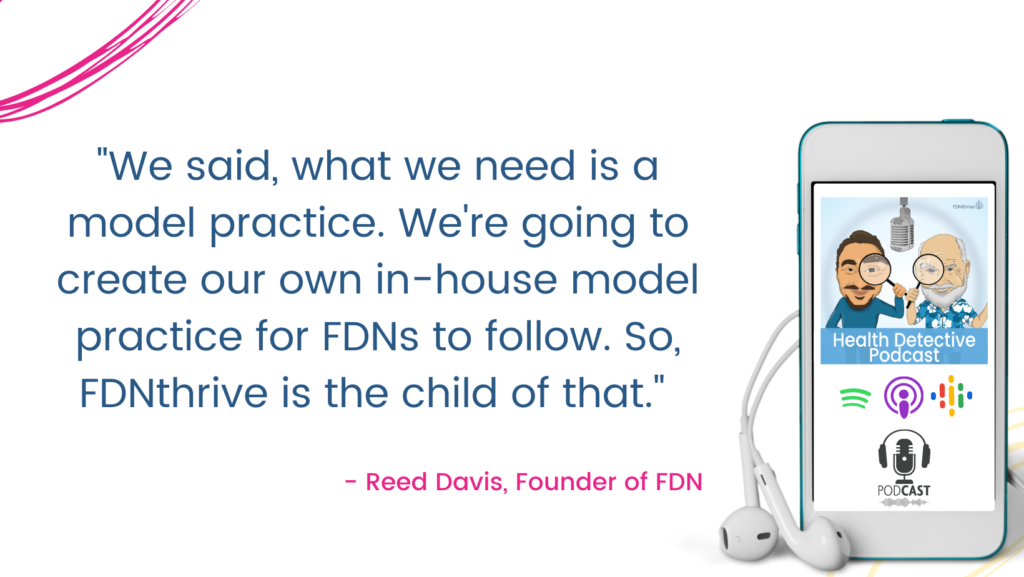
And then there’s people like Jenn, who had very successful FDN practices and there’s a number of others, but not enough, not enough to complete the mission. So, we said, what we need is a model practice. We’re going to create our own in-house model practice for FDNs to follow. So, FDNthrive is the child of that. And it’s an amazing group with you and Joe and Brandy and the rest of the mentors and all the people in there, Pam, of course.

We now have a practice that’s exactly what FDN is supposed to be, not just to serve the public, obviously we want to serve the public. Matter of fact, it’s amazing. What’s happening is a lot of the public, they hire an FDN, next thing you know, they want to be an FDN. That’s another cool thing about it. But it was the mission, which is to teach others, deputize them so they can go and spread the love, so to speak.
Now we’re giving them an exact model to follow and to work in. We have many of our graduates working there. So, the public has this opportunity to get the best of the best like what Jenn delivered to your mom. We’re now doing that as a standard practice that can be easily duplicated by our tribe.
FDNthrive is Ready to Serve You in Your Health Journey
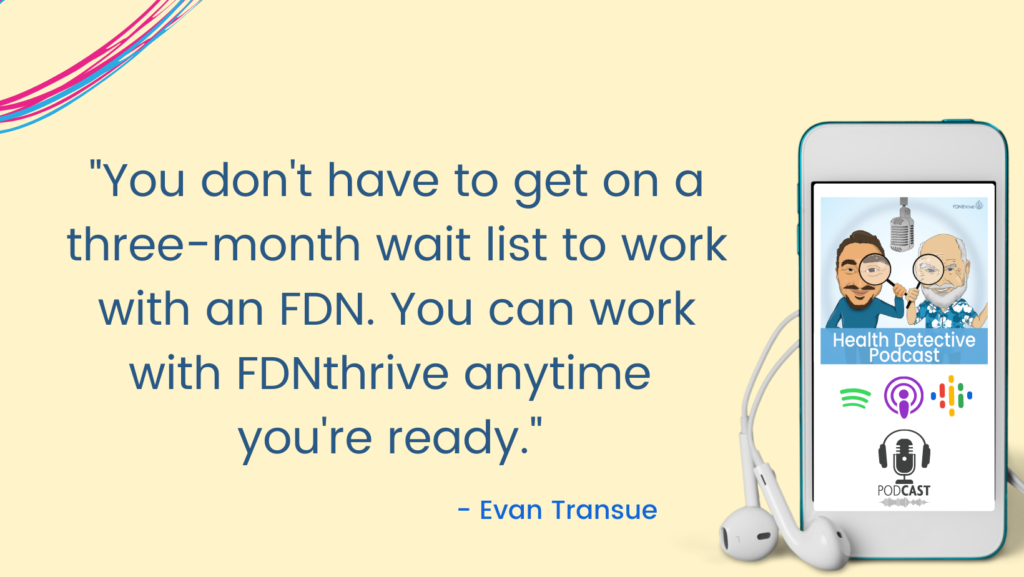
[00:49:25] Evan Transue: Yeah. And since we have so much horsepower over there, you don’t have to get on a three-month wait list to work with an FDN. You can work with FDNthrive anytime you’re ready. I’ve shouted this out on the show before, all you have to do is go to fdnthrive.com. You click that “Free Health Review” button.
We get on a call with people who are going to ask you questions. We’re going to see what’s going on. We’re seeing if we can help you. Chances are very likely that we can. Sometimes someone has to maybe go do something else first.

[00:49:52] Reed Davis: Glad you made that distinction, because we’re not making promises. What we’re saying is why don’t we have a talk so we can see if we can help you? We’re not guaranteeing we could help every single person on the planet, but we need to have a conversation decide. And you can decide if you want to work with us, but we’ll decide if we can help you or not.
If we can’t help you on that Discovery Call, we’ll send you somewhere that can. That’s a promise, that I guarantee you. We’re not going to leave you hanging, oh, we’re not the right company. You know? Good luck on your journey. No, we’ll find someone that can, where you got some little special thing you need to do.
[00:50:27] Evan Transue: I have started every call off with that. I’m like at the very least from today, you’re going to go in the right direction. This isn’t a call where, we’re so sorry we couldn’t help. Have a great one. See you later.
Reed Davis: You keep that up, that’s perfect.
Evan Transue: Always getting people in the right direction.
Where to Find FDNthrive
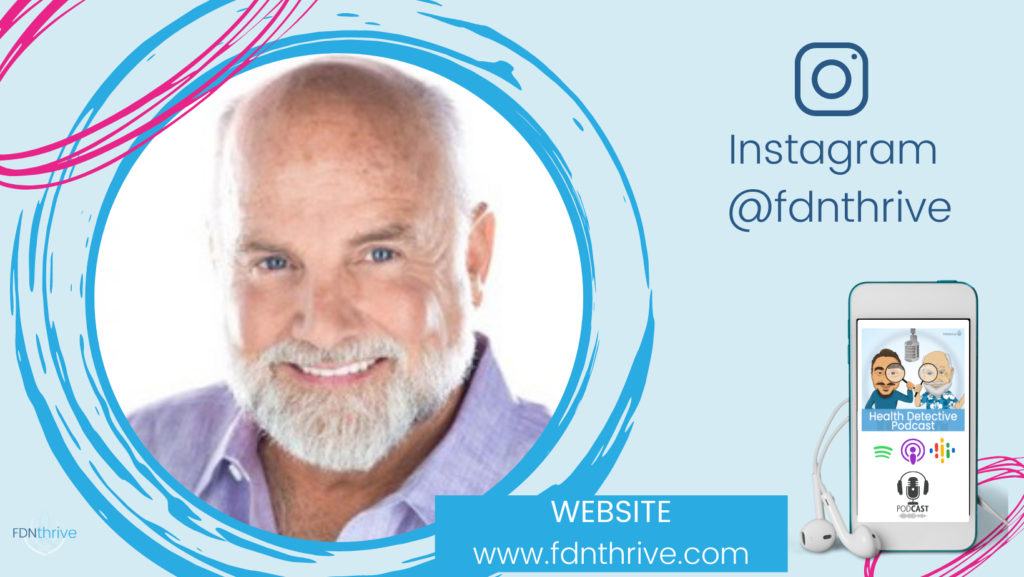
So, we’re almost at an hour. People know where they can find FDNthrive – fdnthrive.com.
The Signature Question
I gotta ask this because we ask a signature question to everyone on the Health Detective Podcast. That is, if I could give Reed Davis a magic wand, and you could get every single person in this world to do one thing for their health, whether that’s literally do one thing or not do one thing, what’s the one thing you’d get them to do?
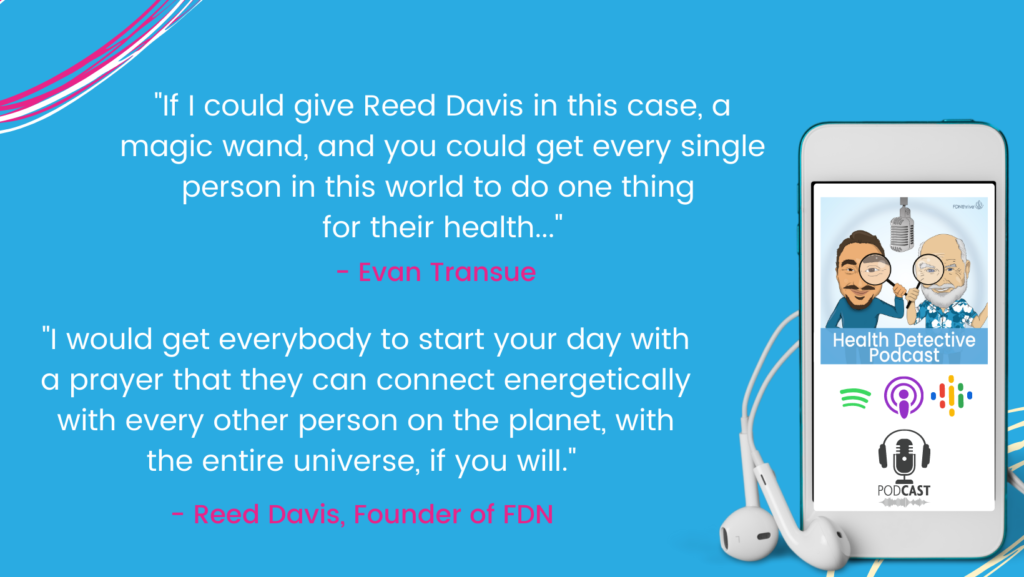
[00:51:03] Reed Davis: Man. I would get everybody to start your day with a prayer that they can connect energetically with every other person on the planet, with the entire universe, if you will. There is one source of creation, and we all belong to it. We all are part of it. It’s there in you. You’re not your mind and you’re not your body.
All your aches and pains are just an accumulation of physical experiences. All your mental junk that you have flying around, and we all have, is just an accumulation of the crap you’ve watched on TV or experienced at your job or family, wherever it is. You’re not just an accumulation of thoughts and body parts and cells and tissues, organ system. You’re something much more important than that.
I make a very feeble attempt every day to connect to that spirit so that I am connected to every other person and living thing on the planet. You can take it beyond that if you want to the stars and moons and everything, if you feel like it.
Feeling Thankful

But when you do that, I find myself feeling thankful. You know, like I’m thankful for you and for Jenn, and I could point out all the things. But I’m really just thankful to be here. And being able to separate myself from body and mind from time to time. And at least I’ve given it a stab. So, if I had to pick one thing, that’s what it would be.
[00:52:22] Evan Transue: I did not expect that at all. That’s awesome to hear. I know that you have that philosophy, but that’s not what I expect is the answer. And I realize I’m wrong with the expectations with the answers like 90% of the time. And that’s why it’s a fun question to ask.
[00:52:34] Reed Davis: I mean, I could have said, you know, 25 jumping jacks.
Conclusion
[00:52:36] Evan Transue: Thank you so much for being here and supporting 100 episodes. We have a perfect five-star rating still to this day, well over 40 ratings at this point, that’s just cool.
[00:52:46] Reed Davis: You’re doing a fantastic job by the way. Congratulations. And thank you for being our podcast host. Well, thank you
[00:52:51] Evan Transue: Well, thank you for having me as it.
Any last words, final thoughts?
[00:52:53] Reed Davis: Just spread the love.
Evan Transue: All right.
Reed Davis: Have a great day. We’re going to go do something fun the rest of today. Evan flew all the way from the east coast. We’re in Southern California right now. So, we’re going to go have some more fun before we send him back to work.
[00:53:07] Evan Transue: All right. Thanks guys. We’ll see ya.
[00:53:10] Thanks for tuning into the Health Detective Podcast. If you are ready to finally work with a real health detective on your health journey so that you can get well and stay well naturally, visit us at fdnthrive.com and click the button the schedule your Free Health Review.




